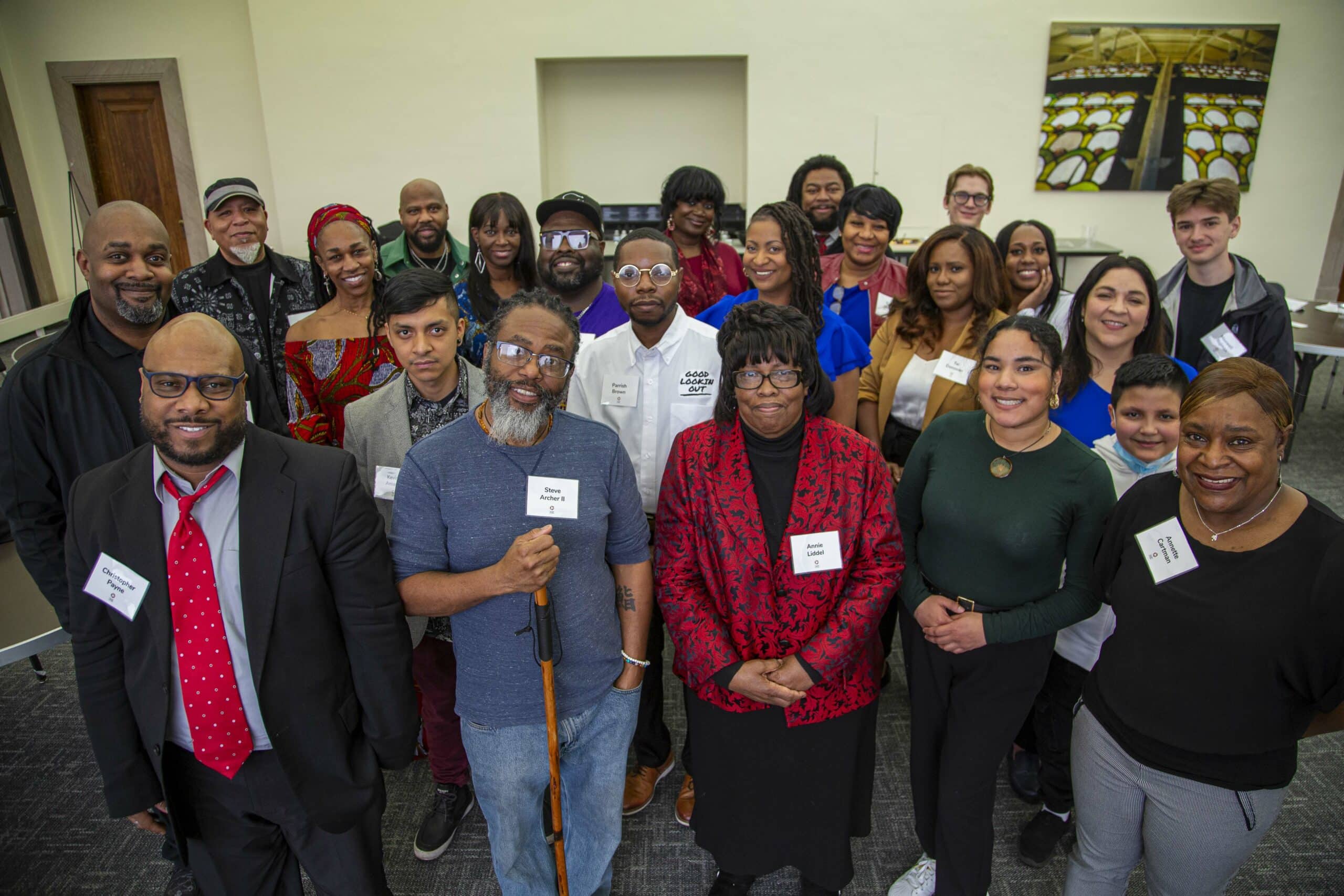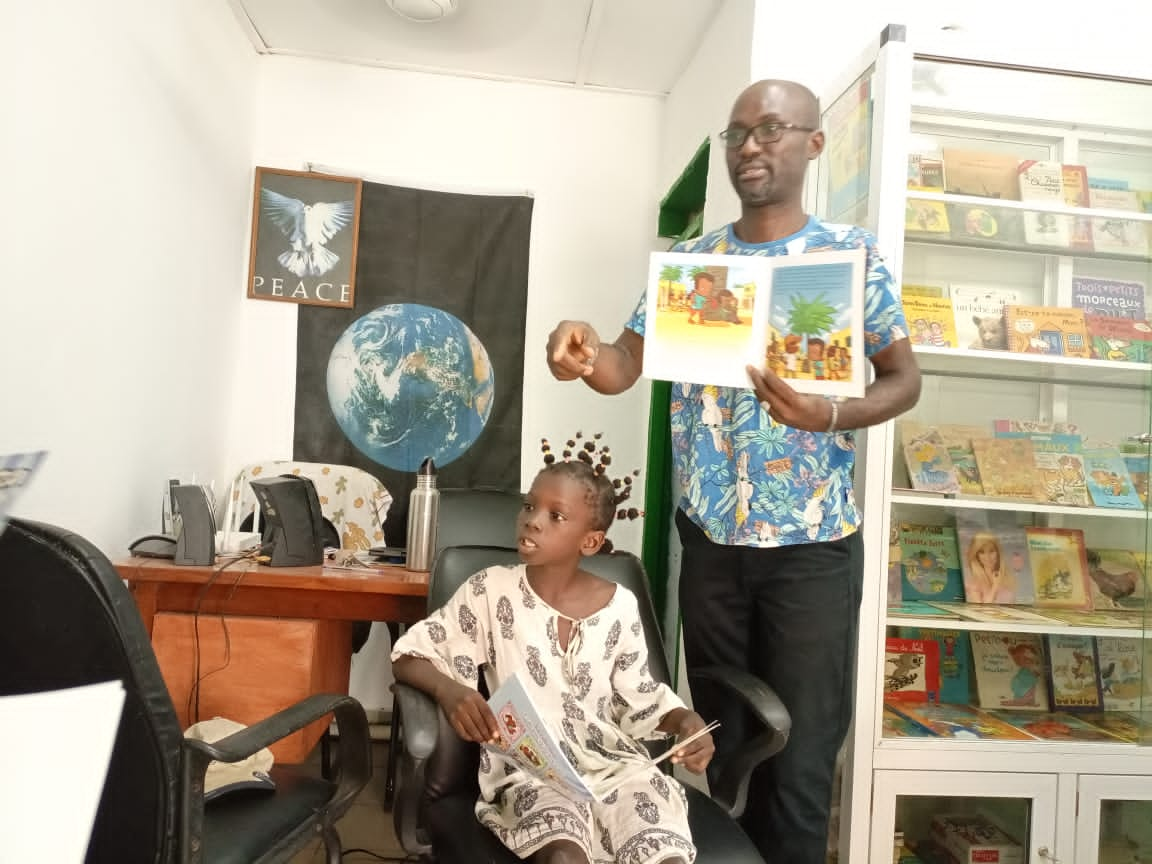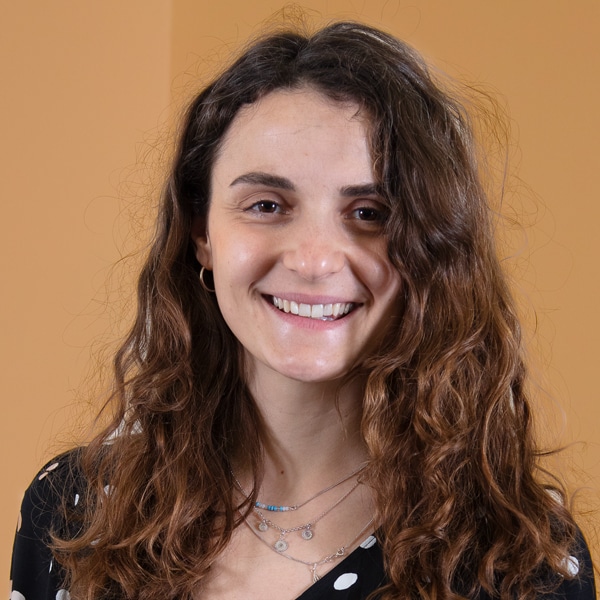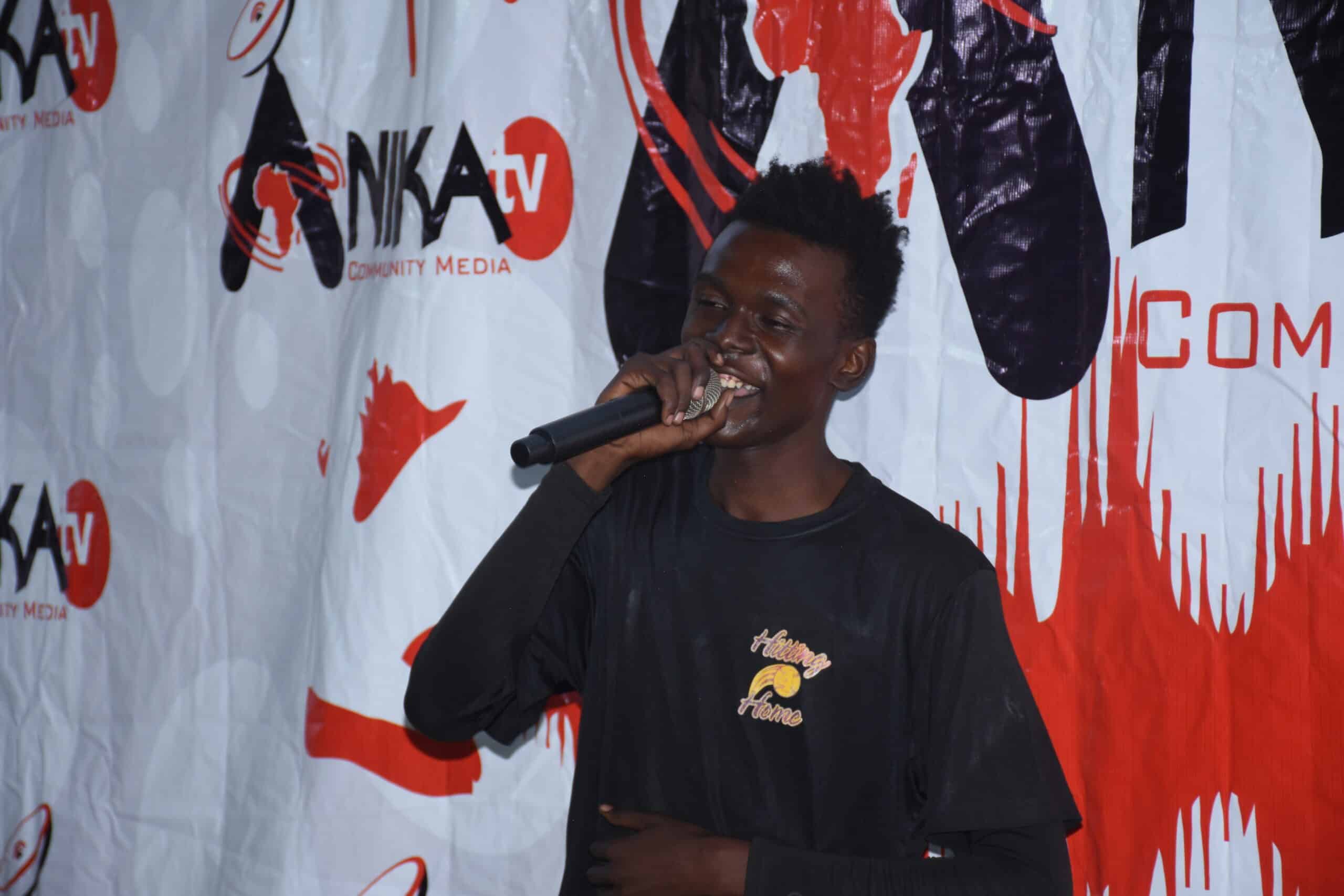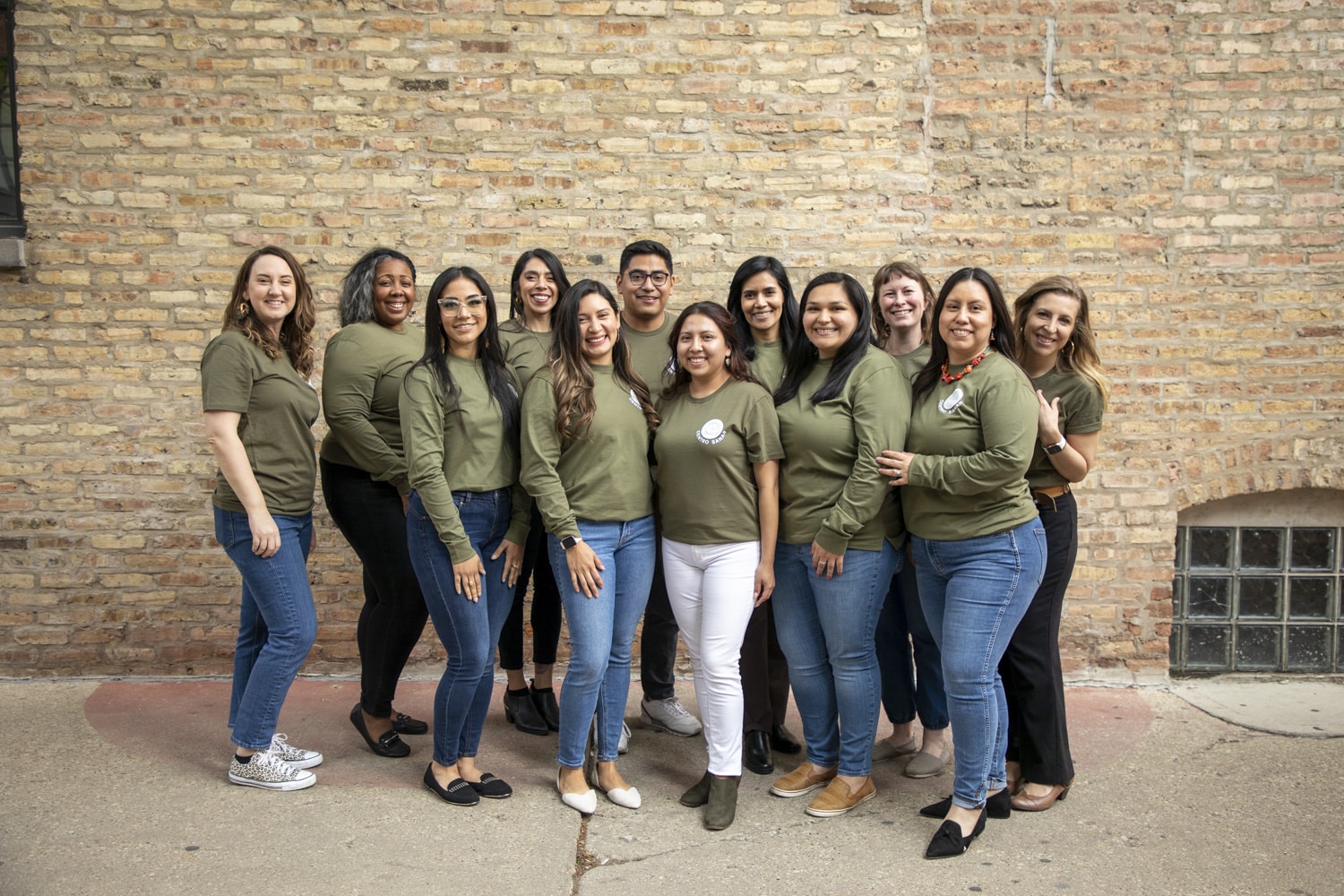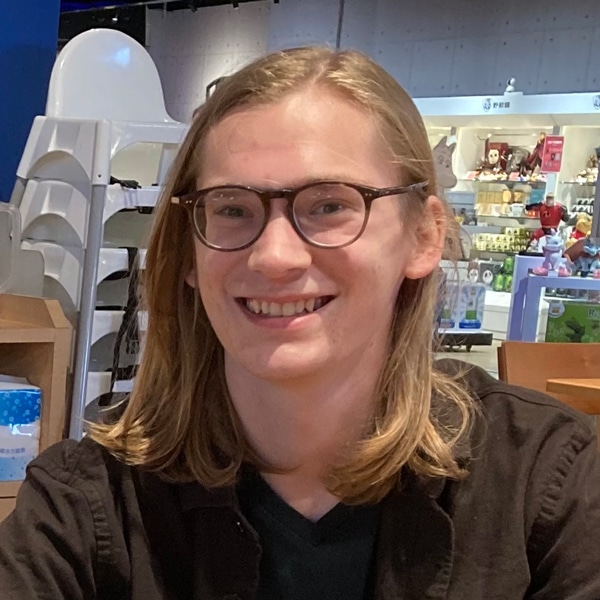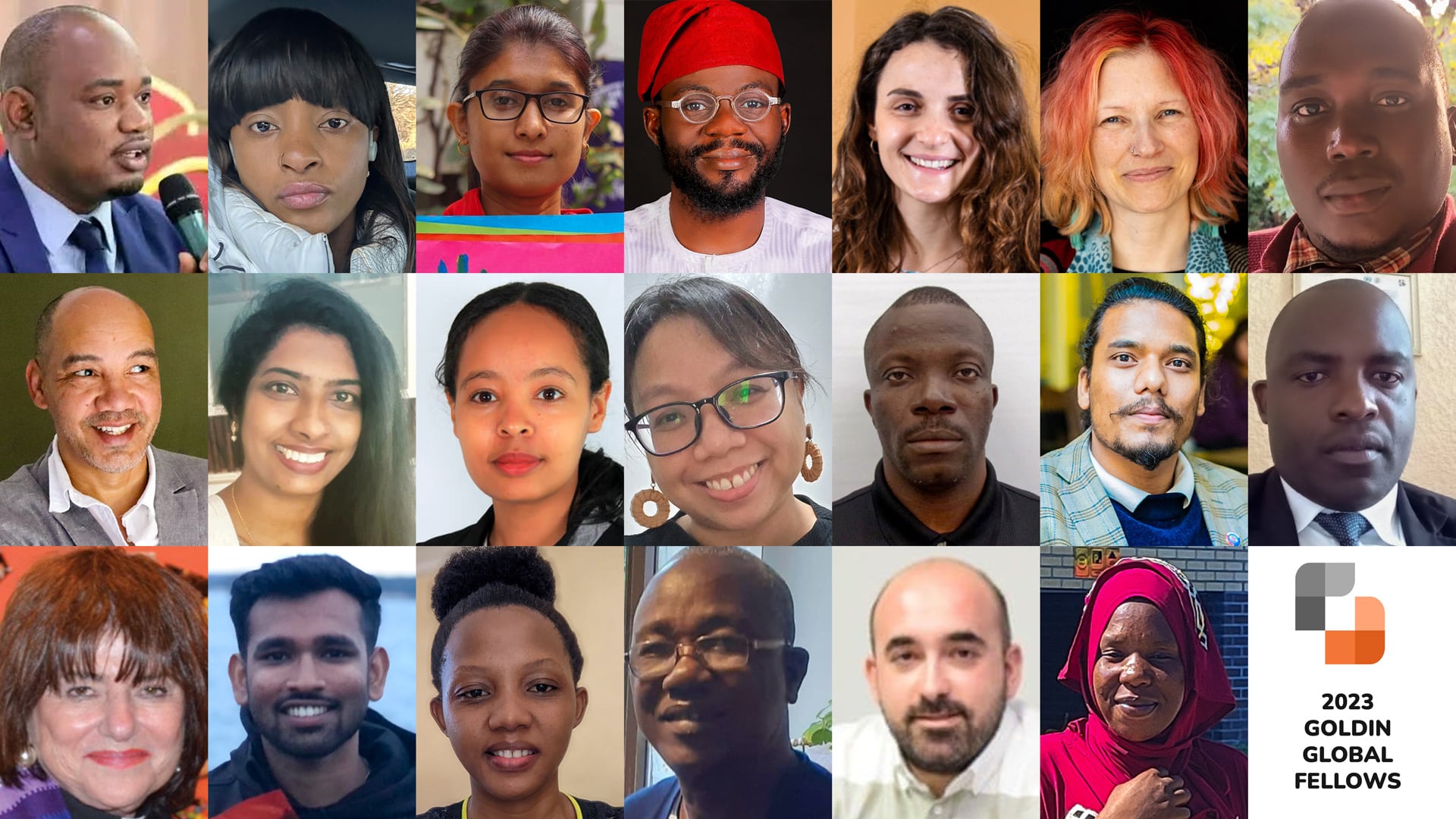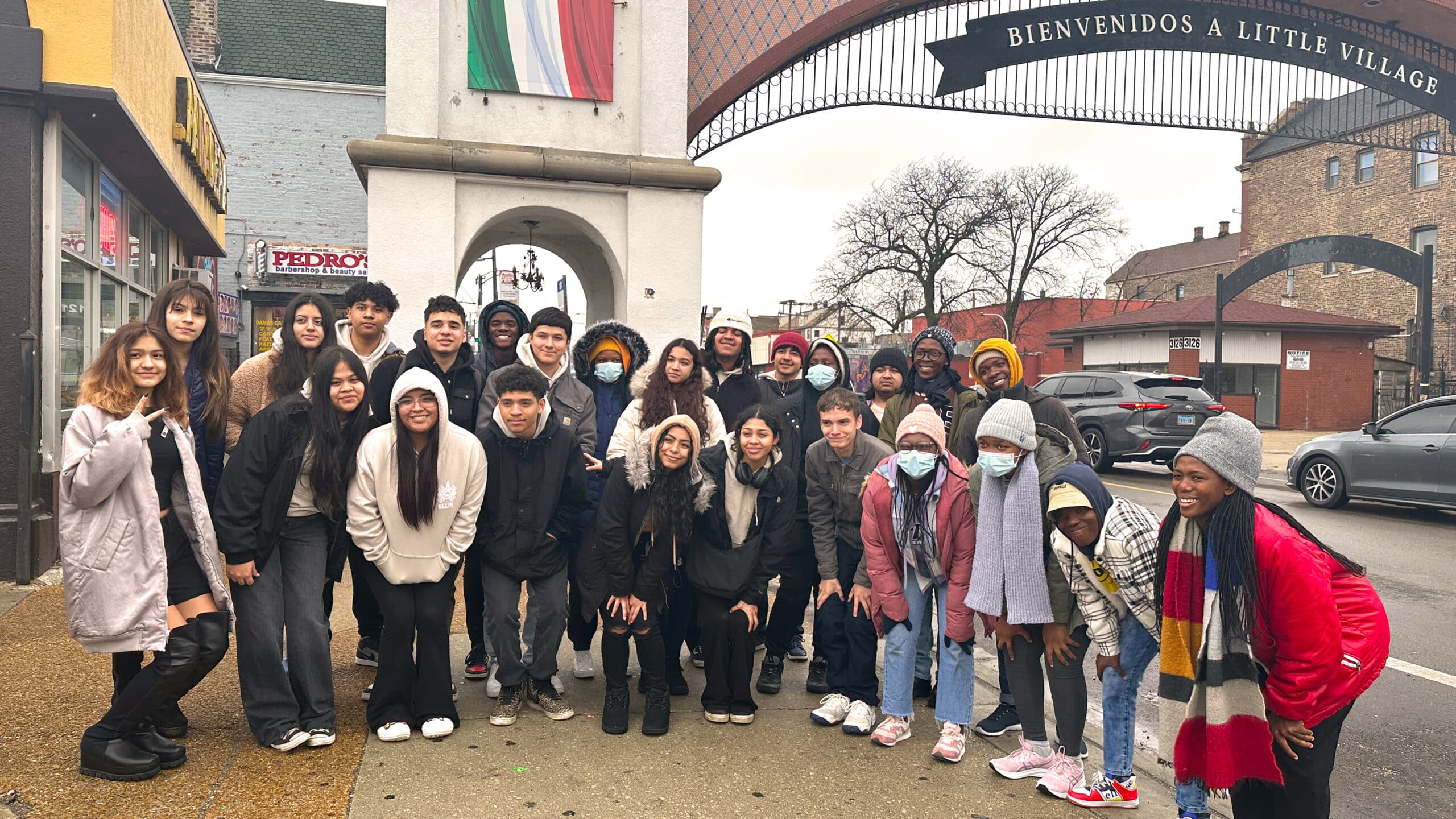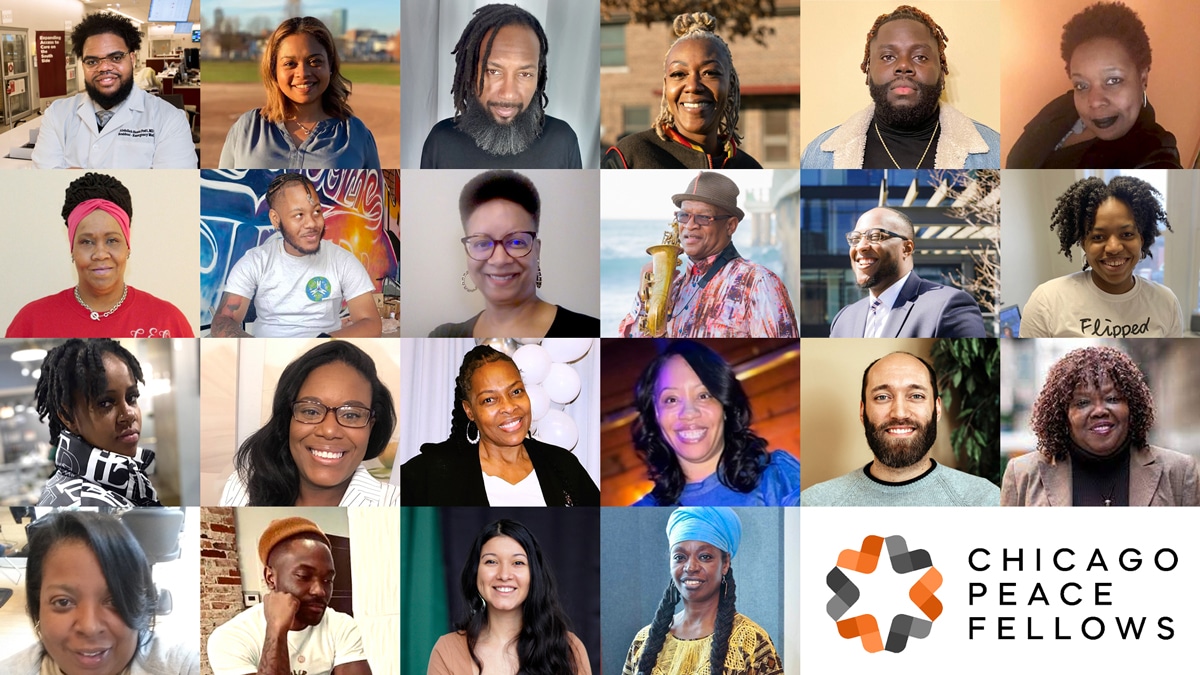Meet the 2024 Chicago Peace Fellows
The Goldin Institute invites you to learn about each of our 2024 Chicago Peace Fellows representing 14 community areas across the city. Founded in 2019 in collaboration with the Partnership for Safe and Peaceful Communities, the Chicago Peace Fellows program is the only leadership development program that is built by and for grassroots community leaders on the South and West sides of Chicago.
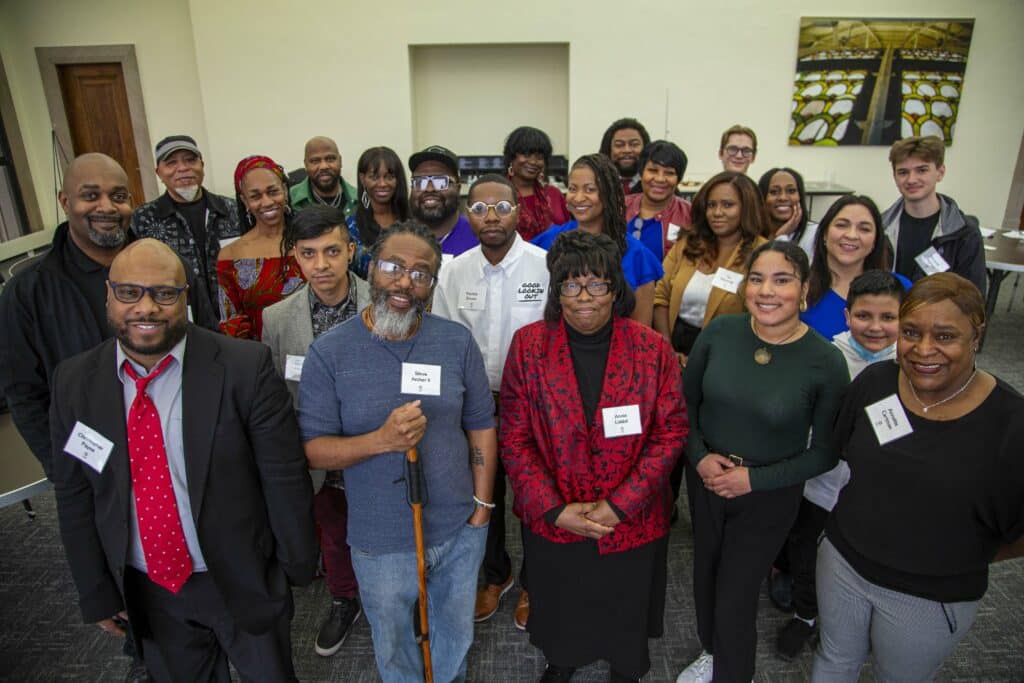
ABOUT GATHER
Peace Fellows participate in GATHER, an online asset-based community engagement course, as well as in-person training, collaborative action projects, and networking experiences with civic leaders, academic researchers, and policy makers. The Chicago Peace Fellows reduce violence by building relationships, engaging youth, collaborative peace building projects over the summer and by creating new networks among residents, families, schools, and nonprofit organizations.
The Fellows are learning together through GATHER, which is both a mobile platform for shared learning and a curriculum for people who want to build on the talents of their neighbors and the assets of their communities to make real and lasting change. Gather Fellows learn and work together through an innovative curriculum that comes pre-loaded on a tablet device with all the connectivity, materials, videos, practices and tools necessary to provide a mobile classroom and toolkit for community leadership.
The Chicago Peace Fellows project connects and equips cohorts of past grantees of the Chicago Fund for Safe and Peaceful Communities to reduce violence and promote peace. The 2024 Chicago Peace Fellows is the sixth all-Chicago cohort to utilize the GATHER platform, an online learning hub built by the Goldin Institute to empower grassroots leaders.
The Chicago Peace Fellows will engage in a 30-week course of intensive shared learning as well as group projects, culminating in a graduation event in November, 2024. The curriculum has been designed in collaboration with the grantees themselves, based on their practical knowledge and hard earned wisdom, with input from a wide range of civic leaders. Fellows will reflect on their past summer work, identify successes and lessons learned, and improve their abilities by sharing strengths and learning new skills.
The Goldin Institute and the Partnership for Safe and Peaceful Communities have aligned missions that value authentic community leadership. The Chicago Fund is uniquely effective at finding motivated problem-solvers and community-builders. By connecting Chicago leaders through GATHER, their efforts to nurture safer and more peaceful communities will be more effective, interconnected and lasting.
OUR PARTNERS
A special thanks to the Chicago Community Trust, the Conant Family Foundation, the Frankel Family Foundation, the MacArthur Foundation, the Polk Bros. Foundation, the Racial Justice Pooled Fund, the Seabury Family Foundation, and the Partnership for Safe and Peaceful Communities for making this program possible.
To follow along the learning journey with the Chicago Peace Fellows, please sign up for our newsletter and follow up on Twitter, Facebook and Instagram.
Transforming a Barbershop into a Children's Library
One day recently, James Offuh, 2022 Goldin Global Fellow and Founder of United for Peace Against Conflicts International (UFPACI) from Côte d’Ivoire, saw kids playing with his barber tools. Realizing the hazards here, he instead offered them some books as an alternative which saw the creation of his Peace Library Project.
This seemingly random moment created a positive change for the kids in his community, highlighting how we can play our part in creating social change by leveraging the resources we already have. As a result, James, a peace advocate and educator, initiated the Children Transformative Literacy Peace Library Project and contributed to a visioning summit by launching a parenting toolkit in his community.
In this piece, he speaks more about this initiative’s impact on the children and their families, the challenges faced, and the driving inspiration behind this transformative work.
A Library Provides a Safe Space for Children
Before the creation of the peace library, which is entirely free to use, James states that children loitered on the streets, playing harmfully like throwing stones at each other, interacting with abuses like rudeness and arrogance, showing hateful sentiments, and being apathetic to one another.
“In contrast, now major outcomes are that children around my community have found a safe space for learning virtues, values that support good moral behaviors.” he says. Further, he believes – through such initiatives – children are more likely to be exposed to peace, justice, social cohesion, and accountability values “Most importantly children are developing interest in books, learning to read and always visiting the book station as a place of socialization.”
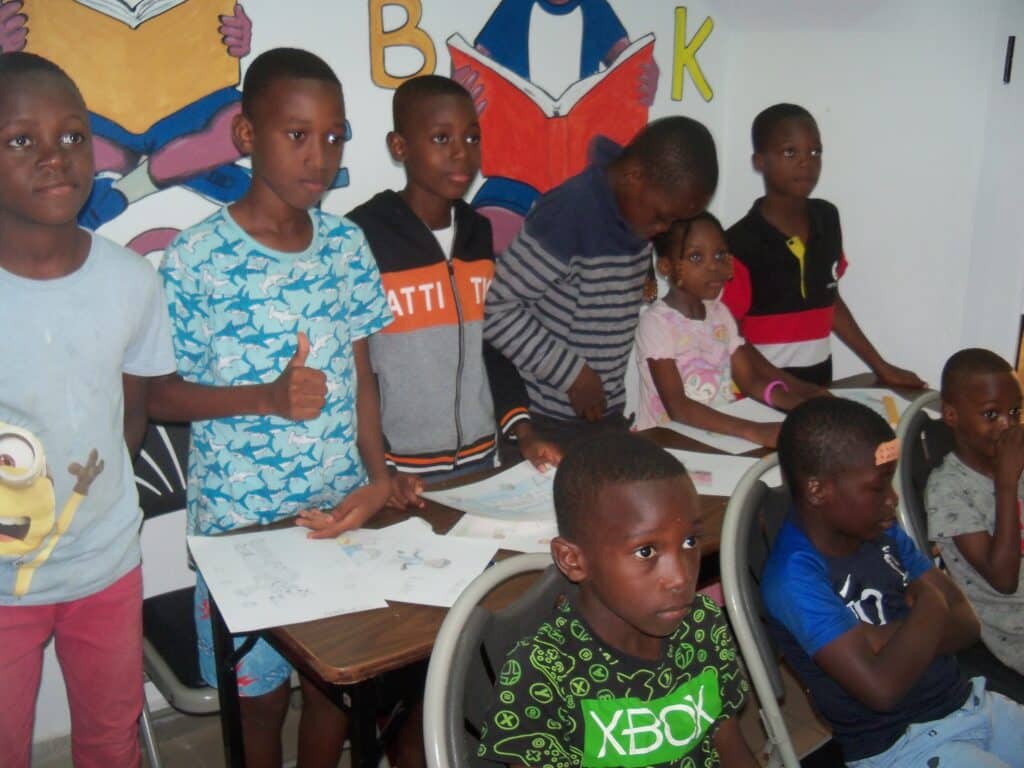
He highlights the role of the ‘Assets Based Community Development’ approach by valuing it as a critical principle to uncover gifts within our community, focusing on what’s “strong” rather than what’s “wrong”.
“When planning a community-driven social change mechanism and action frameworks, such as transforming my barbershop into a community peace library to address early child illiteracy and juvenile crimes, one should pay more attention to the gifts as opposed to deficits in society.”
— James Offuh
James remarks that many children do not have the necessary parenting guidance or resources, which often leads to children and teens getting involved in criminal activities, hard drug deals, and the consumption of marijuana.
This often meant they were sent into juvenile crimes that became alarming in the Abobo town in Abidjan City. James gives a perspective on how this alternative education space outweighs some traditional ways to solve this social problem.
“I discovered that these children, most of them grew up on the streets, had no good moral education background, applying punitive, coercive measures will not solve the problem holistically, as police keep making arrests, imprisonments, etc.“
— James Offuh
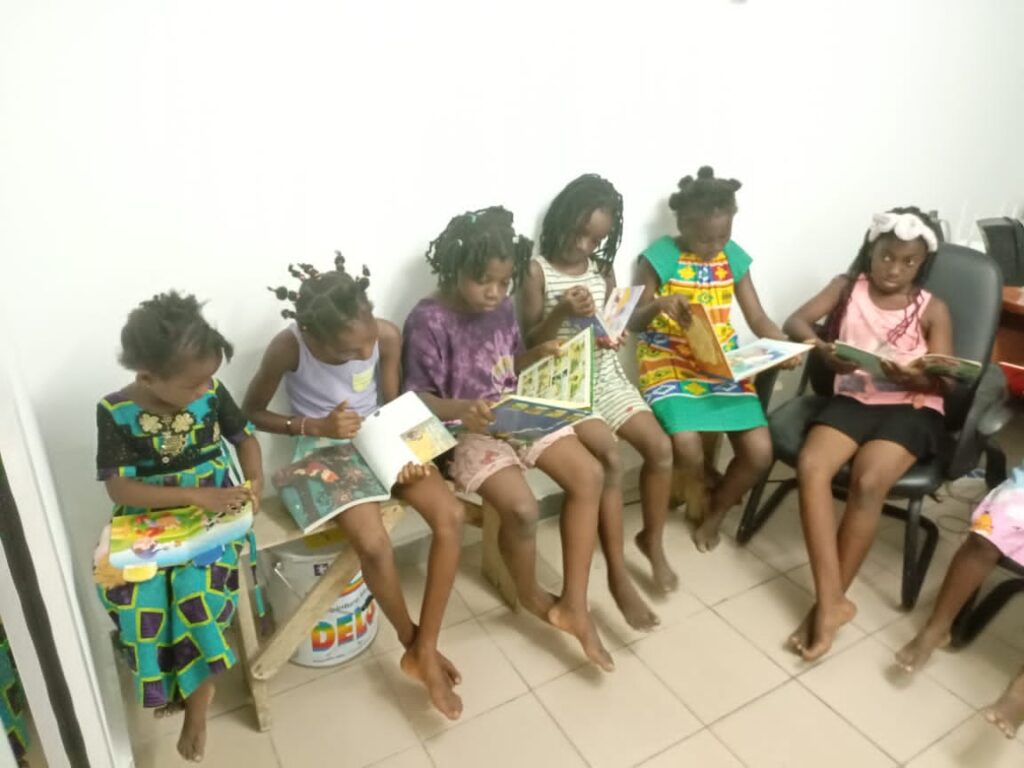
Transformational Peace through Asset Based Community Development
Further, James speaks on how, in his everyday work at the UFPACI, he implements the knowledge gained during his time as a Goldin Global Fellow: “Goldin Institute’s Gather program was an eye-opener to me; before the program, I did not know about the terms ‘ABCD’ approach and Community Driven Social Change action.” Moreover, he recalls how adaptive leadership versus technical leadership helped him understand more conflict sensitivity, analysis, and ‘do no harm’ as a tool for diagnosis over individualistic versus relational context.
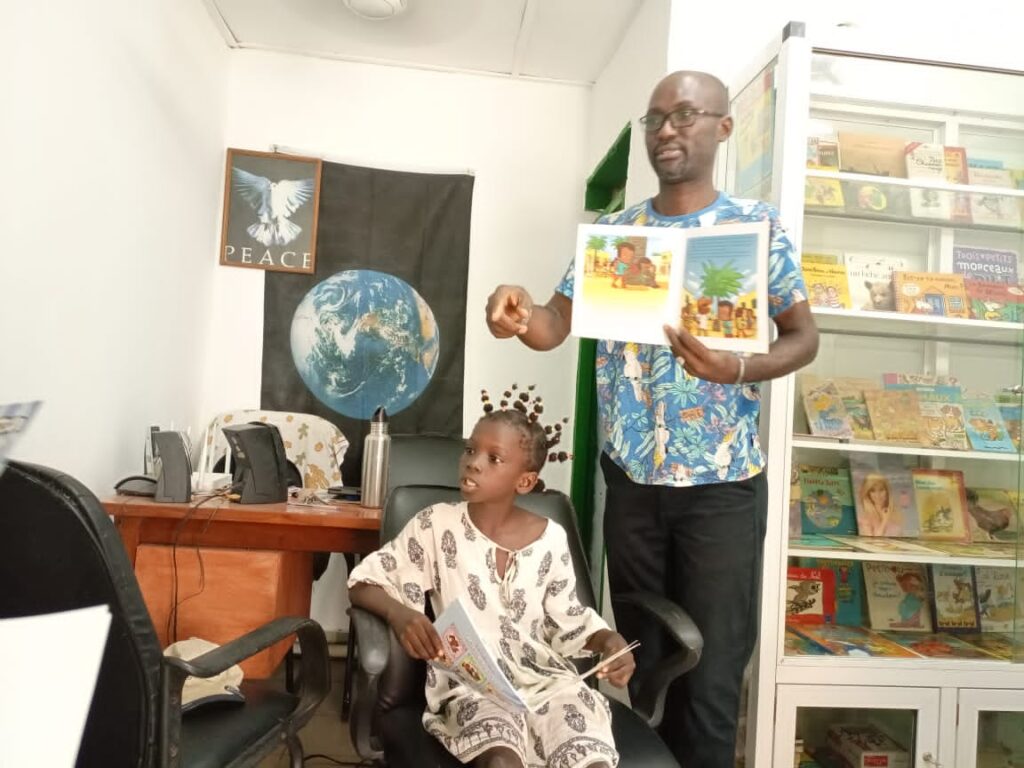
Goldin Institute expanded his global connections, too. “The Gather program expanded my networking, and I got a partner from the U.S.A. who visited me here in Cote d’Ivoire and got my details from the Goldin Institute website. He is also a member of the Gather Global Alumni network.” James also gained free online training workshops, participating recently in Project Management and Strategic Planning, which helped him learn how to design, plan, implement, monitor, and evaluate processes and outcomes.
Conclusively, James leaves us with a saying from Fredrick Douglas:
“It’s easier to build strong children than to repair broken adults.”
With his tireless work and activism at UFPACI, James and his team promote social dialogue, a non-violent culture, and peace reinforcement. Read more about their work and find ways to support them by checking their website: https://ufpacidialogue.net/. You will support the library’s longevity and sustainability so it can serve as many children for as long as possible.
Currently, the library needs infrastructural support like stable internet connectivity, electricity, comfortable reading seats and tables, workshop toolkits like drawing materials, and story books in English and French language.
Anika Talent Show: Empowering Kenya's Youth for Environmental Education
Visual artists, dancers, poets, thespians, and vocalists between the ages of 14 and 25 were brought together in a lively event in Kenya promoting green skills and environmental justice, aligning with the International Youth Day 2023 theme.
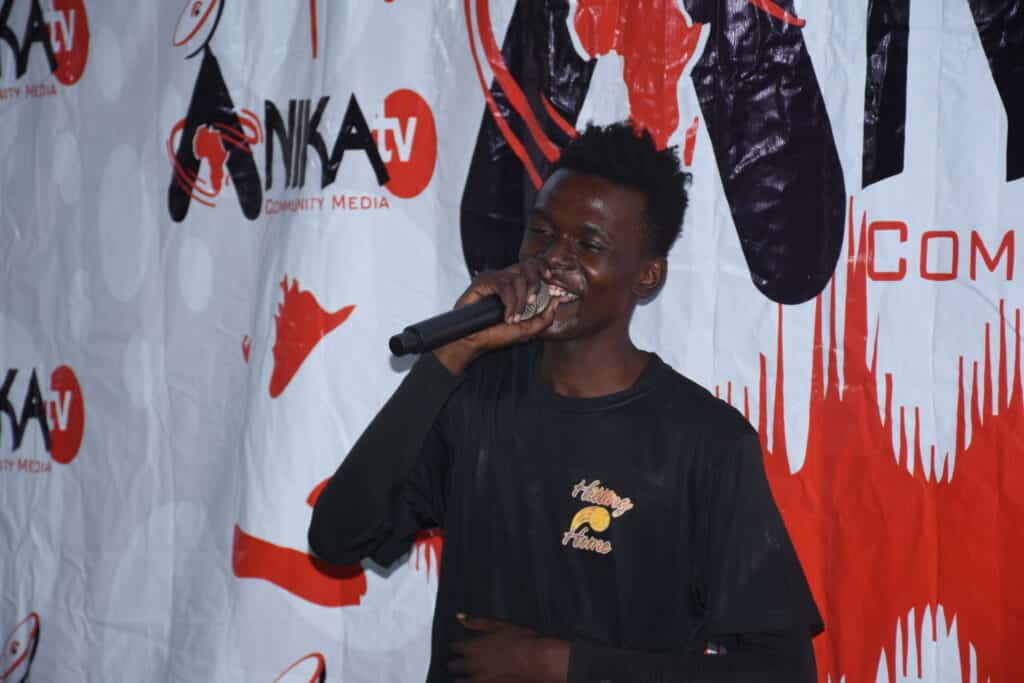
This event was made possible by Nicholas Songora, 2021 Goldin Global Fellow from Kenya and Founding Director Manyatta Youth Entertainment, and his dedicated team behind organizing the Anika Talent Show in celebrating International Youth Day in Partnership with the Forum civ Eastern and Southern Africa hub under the Wajibu Wetu; Jumuika Sikika Program with collaboration from the private sector, religious leaders, persons with disabilities leadership, national and county governments.
Nicholas speaks more to the Goldin Institute about this activity and why it represents a movement that harnesses the power of art to drive change.
He believes that people together can create a sustainable world where everyone, through artivism, contributes to a brighter future. Already, he is leaving his mark on infusing positive change and possibilities among young people.
Nurturing the Youth as Change Agents for Environmental Issues
This gathering equipped young people with green skills and a profound understanding of environmental justice while utilizing the transformative potential of arts to foster sustainability in society.
Nicholas delves into how they incorporated sustainability and environmental justice in this event.
“The activity involved performances like dance and music that narrated stories of environmental struggles, resilience, and hope. These performances fostered empathy, understanding, and a sense of responsibility toward the planet. This was a powerful medium to raise awareness about environmental challenges.” - Nicholas Songora
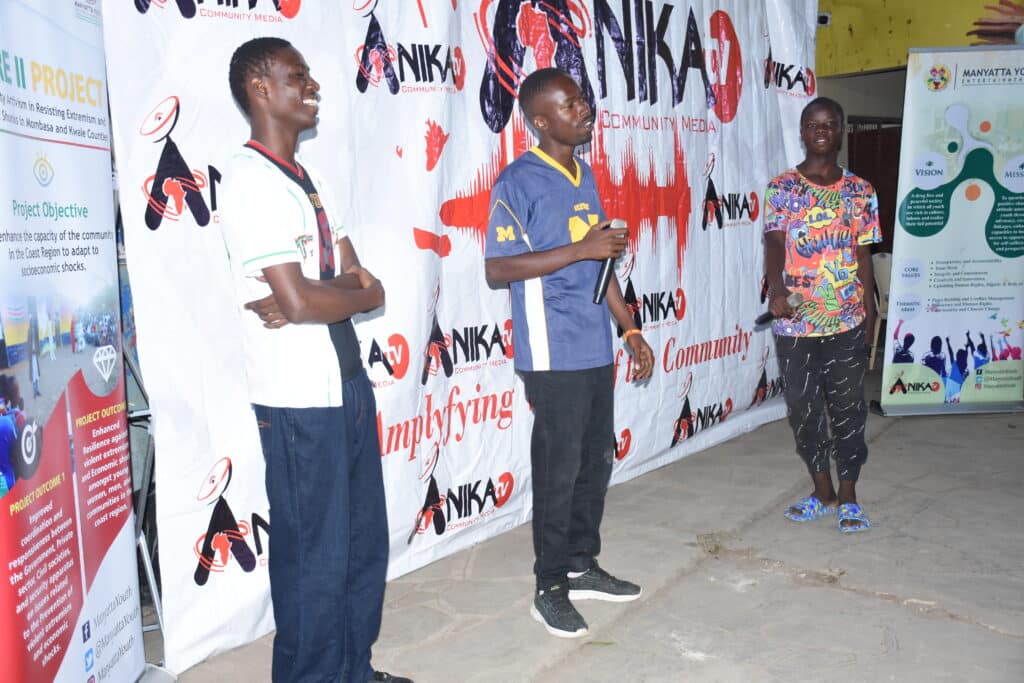
He highlights that photographers pledged to vividly portray environmental issues, ecological beauty, and the consequences of unsustainable practices through art exhibitions.
From the interactive discussion, participants, including village elders, engaged in addressing climate change challenges. They shared personal experiences and ideas for climate action, including sustainable agriculture, waste management, and energy conservation.
Strengthening Community Work through Networking
Further, he expresses his gratitude to several collaborative partners who contributed to the success of the Anika Talent Show.
“As an organization, we prioritize a multi-sectorial approach in programs and project management. According to our strategic focus, one of our critical mandates is to create linkages and alliances with other like-minded organizations and institutions.”
Therefore, Nicholas adds building partnerships and collaborations places the organization at the center of decision-making tables at the county, regional, and national levels.
“This has fostered community ownership and has enhanced sustainability. We collaborate closely with the national and county governments, the private sector, and religious institutions. Also, we collaborate with youth, women, and persons with disabilities networks while forming part of the civil society leadership in Kenya's Coastal region.”
He sees collaboration as fostering cost efficiency and effectiveness, sustainability, and long-term impact accepted by the masses.
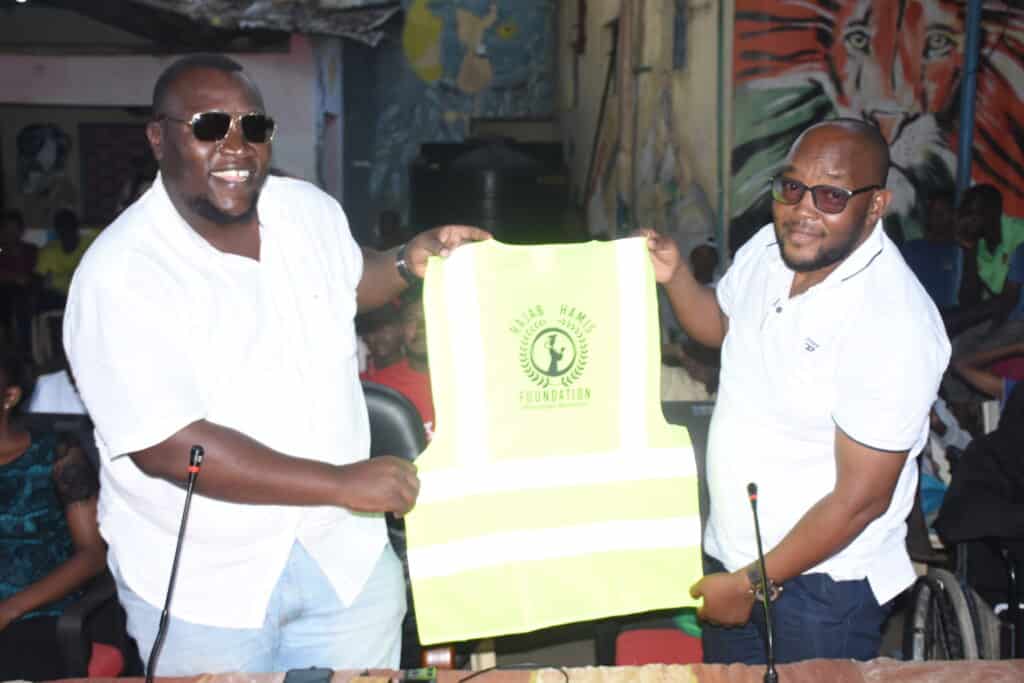
The Lasting Impact of the Goldin Institute Fellowship and Looking Forward
Nicholas acknowledges that he applied the key strategies learned from the Goldin Global Fellowship, from planning to executing the Anika Talent Show.
“Through design, we applied the concept of community asset mapping, which we learned during the Goldin Global Fellowship. In this step, we reflected on the available stakeholders at the grassroots and national levels.”
Further, he elaborates on how they divided into mapping the available resources and funding to support the initiative.
“Identifying potential collaborators was easy, including nominating young people to lead in the activity. Mapping of potential artists within the Anika Community Hub and inviting more from the community.”
Conclusively, drawing from his experience, Nicholas shares his advice with aspiring young people and how they can play a proactive role in their communities.
“The #YouthTribe is a powerful family with all it takes to change the existing narrative and achieve a green economy as a global identity.” he says.
“In most countries, youth form the largest percentage of the population; for example, in my country, Kenya, we are approximately 80% of the population but cannot make a difference if we keep working in isolation. We must unify our voices, be counted, and influence our way to the decision-making table through dialogue and collaboration.”
He draws our attention to the fact that youth cannot win by competing or fighting other stakeholders but by embracing the unity of purpose and fostering collaboration.
Nicholas calls youth to “rise and start building partnerships and networks with multi-stakeholders.”
Interfaith Advocacy to Promote Children's Safety in the Philippines
This July Andy Alegre, 2021 Goldin Global Fellow from the Philippines, engaged in the Regional G20 Interfaith Meeting in Manila (the capital city of the Philippines), moderating a session focused on the online sexual exploitation of children. In this piece, he speaks to Goldin Institute about his experience at the meeting and lessons learned. He also shares a few tips on communicating and working with people from diverse backgrounds while respecting differences to solve issues affecting the community.
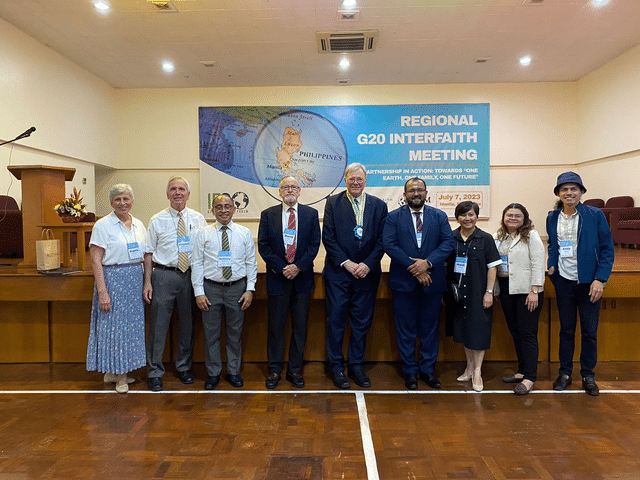
Andy, a people person, emphasizes how being a Global Fellow and offered him global perspectives from his peers during weekly roundtable discussions and connections and during monthly Alumni network roundtables.
He starts our conversation with the Regional G20 Interfaith Meeting in Metro Manila. The five issues highlighted in the meeting were: 1. the interacting demands of climate reform and humanitarian action, 2. emerging challenges of online sexual exploitation, 3. trafficking and modern forms of slavery, 4. children’s education concerning their rights, especially in conflict and abuse situations, 5. protection of freedom of religion and belief.
“It was an excellent opportunity for me to actively know, engage, share, and learn from faith leaders and experts from the government, non-government organizations, and communities on issues that affect most Filipinos.” -
Andy Alegre
The engagement and meeting were significant for Andy, his advocacy, and his community because, according to him, they amplified the issue to various leaders and promoted collaborative recommendations and action.
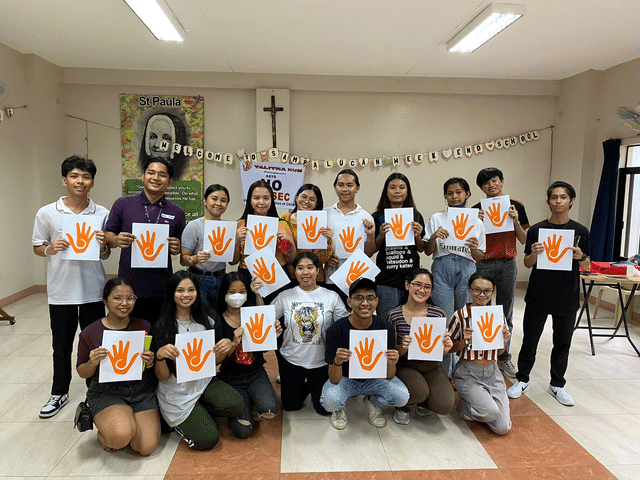
The Importance of Embracing Differences in Interfaith Settings
After the plenary session of experts sharing the five topics, almost 90 meeting participants were divided into five groups based on the thematic areas. Andy moderated one of the breakout sessions, focused on the online sexual exploitation of children, with 29 attendees which he states did not go without its challenges.
“The breakout session was designed to elicit recommendations from attending representatives from various government agencies, non-government organizations, faith-based communities, and networks. I started by calling in some discussion starters to share challenges, best practices, and initial recommendations on the issue.”
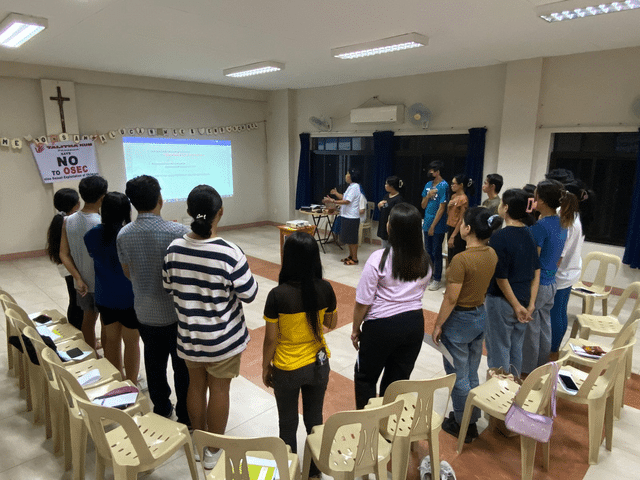
Andy recalls that one of the challenges moderating the session was balancing the time for all breakout attendees to elicit valuable input and stay on the course of the discussion quickly: “Some participants wanted to share much input, but the session had a limited period, and I had to gently remind them to wrap up so as not to take the time reserved for others.”
Another challenge, Andy adds, was summarizing the main points shared and ensuring that all recommendations were captured when wrapping up the discussion. Since he engaged with representatives from the government, church institutions, academia, and faith-based organizations, he also shared some advice on how to best work with people from different backgrounds. He reminds us of the importance of valuing anyone with a unique way of expressing, responding, and contributing to solving an issue that affects us.
“Embracing differences and respectful acceptance are approaches I use when working with people from various backgrounds. I also ensure to address them with the title that they want to be addressed. It is also helpful for me to engage these various representatives because of my experience serving in these institutions and knowing the system and culture.”
- Andy Alegre
Andy believes that being respectful and open are valuable traits that allowed him to be successful in his engagements.
Meeting with International Advocates in the GATHER Platform
Andy met grassroots leaders from around the world two years ago to learn and work together, as a Community of Practice, through the Goldin Global Fellows program, which he cherishes today. “My experience as a Goldin Fellow has been excellent as I learned valuable lessons, methods, tools, and approaches in my community development and engagement work.” he says.
While discussing influential resources, Andy mentions the GATHER platform:
“The GATHER platform tremendously contributed to my learning as a professional and community activist. The platform was easy to navigate and use and facilitated intuitive and practical learning by providing useful concepts and examples for community leaders like me."
- Andy Alegre
In addition to the content on the platform, what enriched Andy's learning was his fellow cohort members' meaningful and valuable reflections and contributions. “I also appreciate that the program is so inclusive – multi-generation, multi-faith - with fellows from all over the world with diverse backgrounds and identities” he says in a conclusive note.
Suggested Article:
Meet the 2023 Goldin Global Fellows English Language Cohort
An Alternative Mental Health Care Model Emerges on the Southwest Side
In August of 2023, Chicago Beyond, a philanthropic organization that invests in organizations working to ensure that young people and community members are free to live full lives, announced a $1.6 million investment in Centro Sanar.
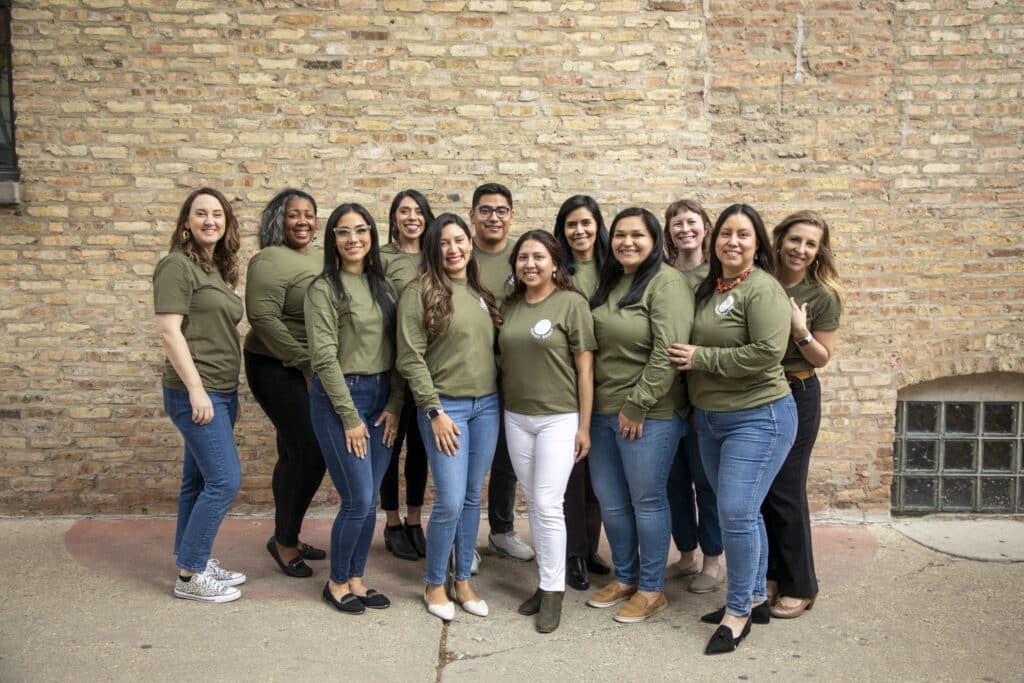
Centro Sanar, co-founded by 2022 Chicago Peace Fellow, Edwin Martinez, provides free mental health services to the southwest communities of Gage Park, Brighton Park, South Lawndale "Little Village," and Back of the Yards. This funding will help support Centro Sanar’s mission of addressing nationwide mental health service gaps in Latinx communities through a replicable model that acts as an alternative to the current mental health industry.
Chicago Beyond initially identified Edwin and the work Centro Sanar was doing through exploring the value of lived experience in community engagement and mental health services. A Growth Manager at Chicago Beyond found Edwin through an article in The Trace, a media outlet that reports on gun violence. As conversations between Chicago Beyond and Centro Sanar developed, it became clear that Centro Sanar had cultivated deep connections with both community members and organizations that serve the Southwest side. This ultimately resulted in a lasting partnership between the two organizations:
As an organization, Chicago Beyond deeply values Centro Sanar’s founders’ lived experiences and believes that in consultation with their partners and with those that they serve. Centro Sanar is serving the community’s needs, addressing systemic harms, and delivering a lasting impact.
-Lisa Caldeira, Growth Manager at Chicago Beyond
Centro Sanar is made up of social workers and therapists who have around 50 years of collective experience. When asked about the quick expansion of Centro Sanar, Edwin responded: “A lot of our success has been due to the community uplifting our work. We started off as volunteers in March of 2020 under the incubation of the Port Ministries. That provided us with a space to start the work and provide clinical services, which started to blow up in November of that same year when we started to receive funding. Fast forward to May of 2022, we were able to quickly launch a 501(c)(3) due to our relationships with stakeholders who were able to bring on state funding.”
By facilitating the development of lasting relationships between clinicians and community members, Centro Sanar has been able to expand its services rapidly and offer new forms of mental health services to an underserved population.
A Non-Medicalized Approach to Mental Health Care
Centro Sanar takes a non-medicalized approach to mental health care, which the team credits with the success of its programs. Edwin has seen mental health programs that take a medicalized approach fail due to the way their systems were funded and their way of reporting services to the government: “Our clinicians don’t have a fifty patient caseload, they don’t have a specific productivity guideline like in a medicalized system. They don’t have to do thirty five hours of clinical work for billing purposes. They are able to do community-based presentations and different levels of engagement so that they meet with community members when they are not in a state of crisis. This also means word of mouth referrals increase.”
The majority of Centro Sanar’s patients enter their care through word of mouth referrals, which means that neighbors and family members are sharing and promoting mental health care resources and are trusting Centro Sanar’s model of care. Word of mouth referrals also reduce the stigma of seeking out mental health care as friends and family members in the community encourage individuals to seek out preventative care prior to a mental health emergency.
By functioning outside of a medicalized mental health care model, Centro Sanar is also able to extend its mental health services outside of times of crisis. Whereas many medicalized mental health services are designed to tackle mental health emergencies, Centro Sanar expands services to preventative forms of mental health care. When asked what separates Centro Sanar from traditional mental health services, Edwin replied,
Consistency and presence. We’re one of the few organizations that provide free long-term care, consistent care that is not just twelve to twenty four 30-minute sessions over the course of six weeks. We’re doing what community members want, which is consistent and quality care. Even as a small organization we are making sure that we are providing long term service at different clinical modalities that tend to be inaccessible to our population and providing them in the language that they speak. That’s something that is often inaccessible in the current mental health landscape that we are in.
-Edwin Martinez, Executive Director at Centro Sanar
Collaborating to Expand Access to Services
One way that Centro Sanar is tackling the problem of helping underserved populations is by working with other organizations that complement their mental health services. For instance, their partnership with Port Ministries not only provides Centro Sanar with a space to operate from, but also allows for a co-location of services. Port Ministries, run by peer Chicago Peace Fellow Alumni David Gonzalez, offers services that complement Centro Sanar’s such as a free health clinic and an afterschool programs that can assist with child care.
Centro Sanar has also been able to co-locate with PODER, an immigrant integration center that works primarily with Spanish-speaking adults. PODER provides a space for Centro Sanar to operate from and also allows for a co-location of services. PODER offers programs that complement Centro Sanar such as workforce development and immigrant integration services. Offering behavioral health and workforce development with the same space increases the capacities of both organizations by streamlining referrals, access to care, and improving different areas of wellness.
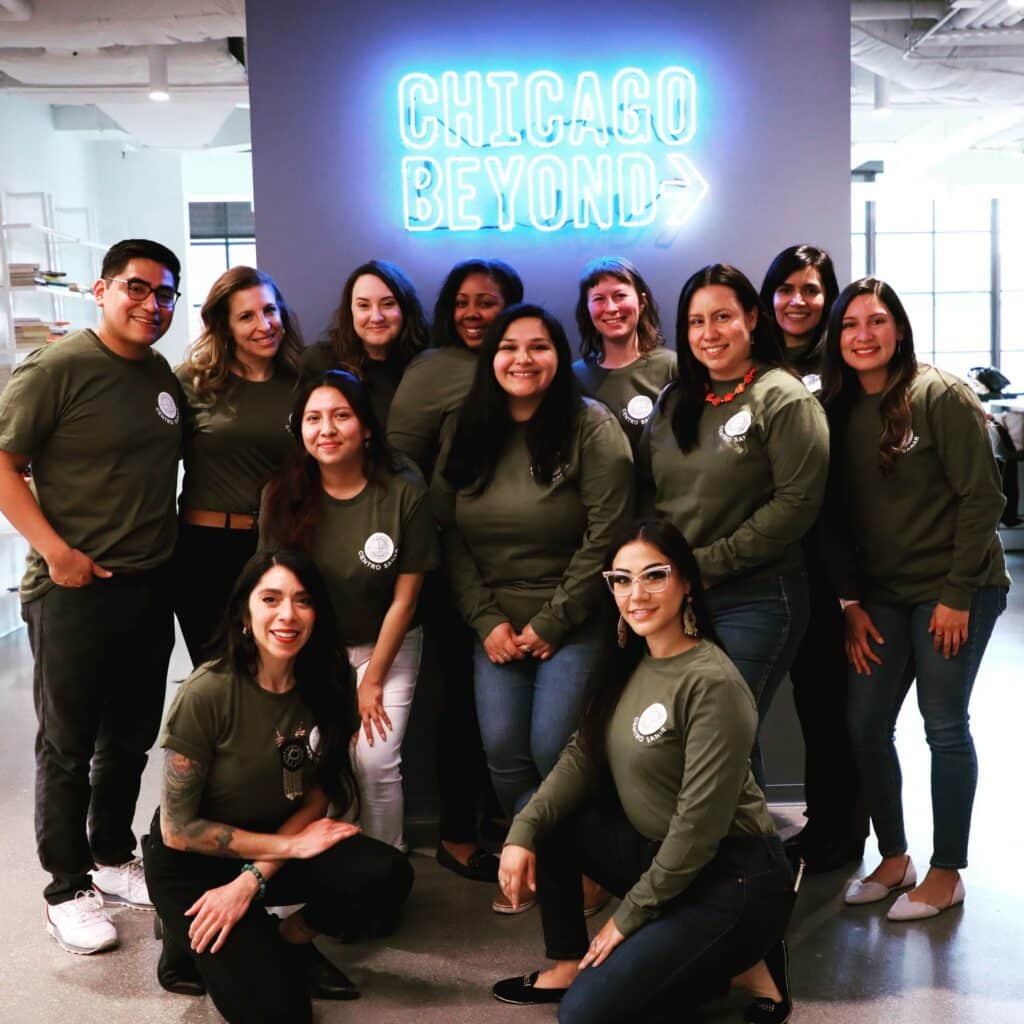
There is no shortage of work for Centro Sanar, they currently have a 10 month waitlist for individual therapy with close to 300 people waiting to receive services. This need is largely amplified by a systemic disinvestment of mental health services for BIPOC communities. As a young organization, the investment from Chicago Beyond will allow Centro Sanar to sustain their work and establish themselves as an organization. The funding provides financial flexibility for Centro Sanar to focus on what they know to be most critical for their organization and their clients. Financial security also allows Centro Sanar independence in establishing itself as an organization and figuring out what is needed in their infrastructure.
Both Chicago Beyond and Centro Sanar are especially excited at the prospect of serving as a blueprint for alternative mental health services in the future. Edwin in particular is hopeful that some aspects of Centro Sanar’s model of care can be extended into the public space, emphasizing that he would like Centro Sanar to, “give an example of an organization that is being creative, that is being innovative, and that is researching its work. This has always been a passion of mine, how can a public mental health clinic adapt this model to be implemented in its work.”
Central to both Centro Sanar’s growth and to its future is its ability to weave in partners to its mission and strengthen the community fabric. Lisa of Chicago Beyond emphasizes: “The team at Centro Sanar have carefully crafted combinations of ways to engage community members toward healing, not just towards dealing with instances of loss and grief, but towards a deep intergenerational wellness. For communities that have experienced generational harms and systemic oppression, receiving care that is long-term, free of charge, and accessible — culturally, linguistically and physically — leads to individual and familial healing, which in turn leads to community healing.”
Meet the 2023 Goldin Global Fellows English Language Cohort
by Yusuph Masanja, Co-Facilitator, Goldin Global Fellows
The Goldin Institute is proud to introduce the 2023 Goldin Global Fellows (English Language Cohort)!
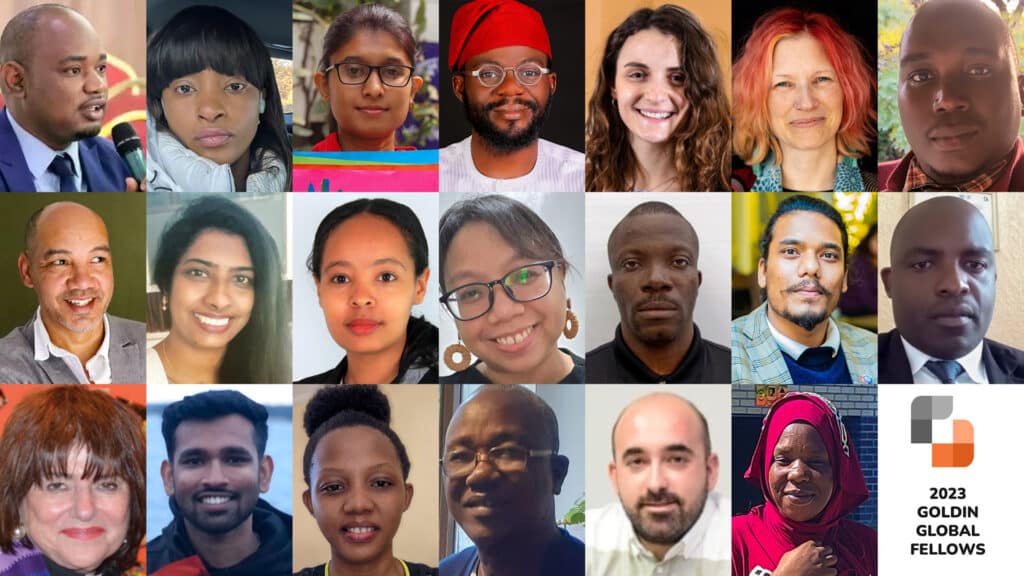
We invite you to learn about each of the outstanding Goldin Global Fellows who live and work in Albania, Bangladesh, Burundi, Cameroon, Ethiopia, India, Kosovo, Malawi, Mali, Nepal, Nigeria, the Philippines, Senegal, South Africa, Sri Lanka, Tanzania, the United States and Zimbabwe. This diverse group of fellows will learn and work together as a Community of Practice, building on the talents of their neighbors and the assets of their communities to make real and lasting change around the world.
ABOUT GATHER
The Fellows are learning together through GATHER, which is both a mobile platform for shared learning and a curriculum for people who want to build on the talents of their neighbors and the assets of their communities to make real and lasting change. Gather Fellows learn and work together through an innovative curriculum that comes pre-loaded on a tablet device with all the connectivity, materials, videos, practices and tools necessary to provide a mobile classroom and toolkit for community leadership.
The Goldin Global Fellows connects and equips grassroots leaders across the world to lead community driven social change. The 2023 Goldin Global Fellows is the fifth international cohort to utilize the GATHER platform, an online learning hub built by the Goldin Institute to empower grassroots leaders. They will engage in a 22-week course of intensive shared learning as well as group projects, culminating in a graduation event in Fall 2023. The curriculum has been designed and refined in collaboration with the Fellows themselves, based on their practical knowledge and hard earned wisdom, with input from a wide range of civic leaders.
To follow along the learning journey with the Goldin Global Fellows, please sign up for our newsletter and follow up on Twitter, Facebook and Instagram.
Teaching the Importance of Pluralism and Social Inclusion through Robotics
By: Zeki Salah, Communications Associate
A global grassroots robotics initiative, One Team Two Continents, brought thirteen South African students to Chicago in March to participate in a FIRST robotics competition. The project was a joint collaboration between 2019 Chicago Peace Fellow Jackie Moore and 2018 Global Fellow Dieudonne Anumbosi Allo. Funding from the Chicago Peace Fellows Mutual Aid Collaborative and the U.S. Embassy in South Africa enabled the team to provide cultural programming and transportation for the South African students as well as their Chicago robotics team mates.
The Mutual Aid Collaborative consists of 74 Black and Brown leaders and committed allies who live and work in the communities they serve on the South and West sides. They have raised over $100,000 to support several active projects. As an expression of solidarity and support, The Funders Pledge, a project of the Mutual Aid Collaborative, decided to share their funding with the One Team Two Continents team to help cover the local costs of hosting the students.
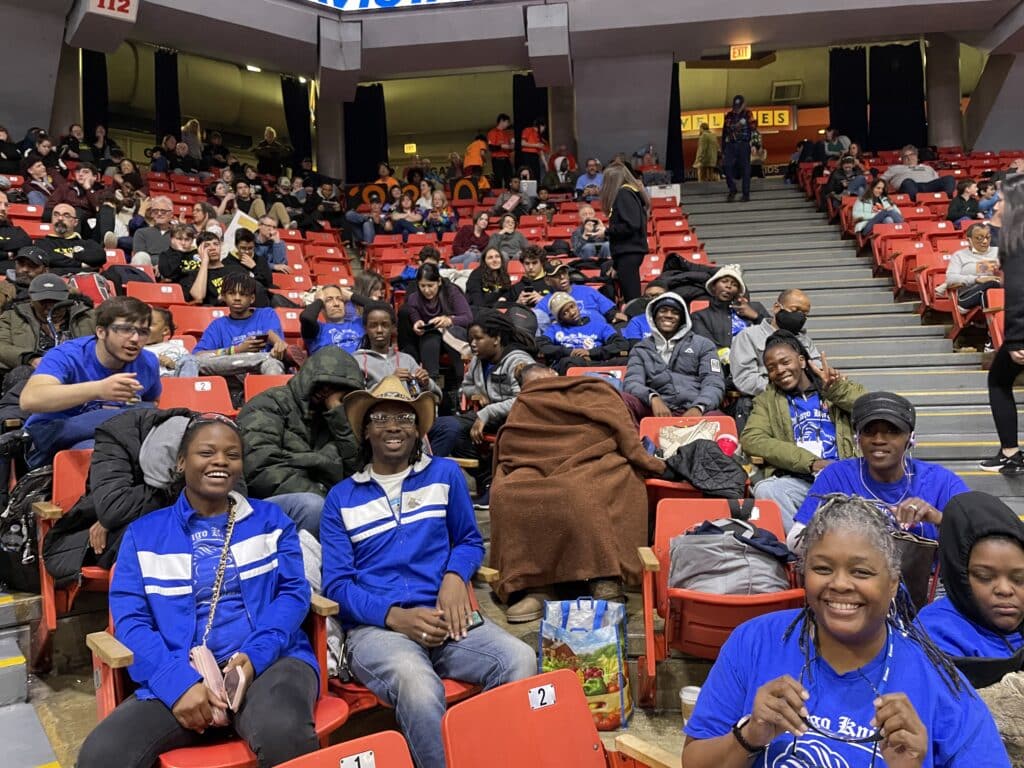
Both Jackie and Dieudonne have experience working with youth in STEM education, making them strong collaborative partners. Dieudonne is the CEO of the Global Leading Light Initiative, a non-profit in South Africa which supports young people in historically disadvantaged communities to acquire future proof skills, with the aim of reducing poverty and inequalities. Jackie is the founder and Executive Director of Agape Werks, Inc, a community based non-profit in Chicago with a mission to promote in young people an appreciation of math, science, technology, and engineering as strategic tools for success regardless of life circumstances.
The partnership between the students in Chicago and Port Alfred dates back to 2019, when Allo and Moore developed the “One Team Two Continents” concept after meeting through the Goldin Global Fellows program to explore cross-continental collaboration opportunities. This initiative envisions a youth-led, distributed team working together on robotics projects in an environment that fosters inclusion and cultural pluralism. The students from both continents convened under the banner of the Chicago Knights, a community based, borderless, and inclusive all-city FIRST Robotics team.
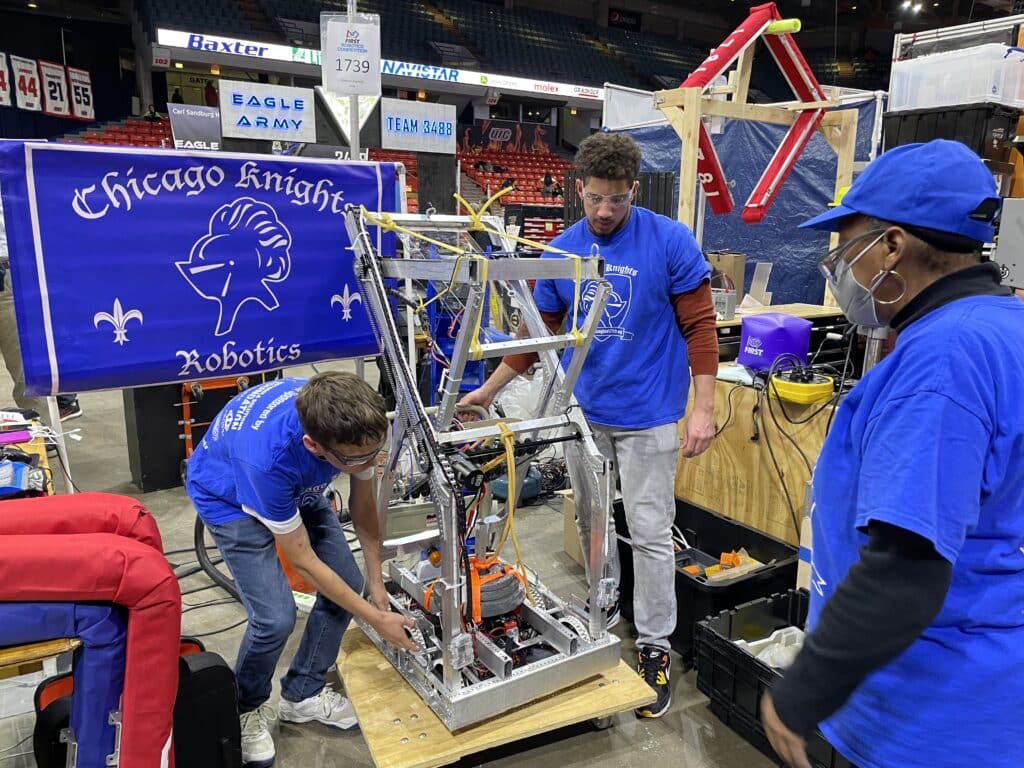
Prior to collaborating with Dieudonne, Jackie had been invited a few times to teach robotics in Uganda and South Africa. These opportunities did not meet her philosophy of teaching, which is to “not to become the expert in the room, but to work collaboratively with someone.”
Soon after Jackie and Dieudonne met, the pandemic hit and remote learning opportunities allowed for the students from South Africa to be involved in collaborative robotics programs. They collaborated remotely for an entire season of robotics competitions. Remote work did have its challenges, Jackie explains, “the way that I typically work really requires a lot of hand-on teaching.” While the virtual environment made it difficult for students to focus, especially in Port Alfred where they often faced the challenge of unstable internet connections and recurring “load shedding”, the students held on and kept coming back for robotics opportunities.
Things changed for the One Team Two Continents team when a grant from the U.S. Embassy's U.S. Mission to South Africa provided funding for students to travel between Chicago and Port Alfred. When applying for the grant, Jackie and Diedonne focused strongly on the fact that the kids from South Africa and Chicago would be working together as one team. Their project proposed to demonstrate the value of pluralism and social inclusion in a robotics environment. This allowed for the teens’ interest in robotics to be placed front and center while showing the value of pluralism and social inclusion through working together as a team.
The exchange between the students in Chicago and the students in Port Alfred went both ways, with the Chicago students having an opportunity to visit South Africa in October of 2022. Together the teammates built small robots and did exercises to develop capacity for working cohesively as a team.
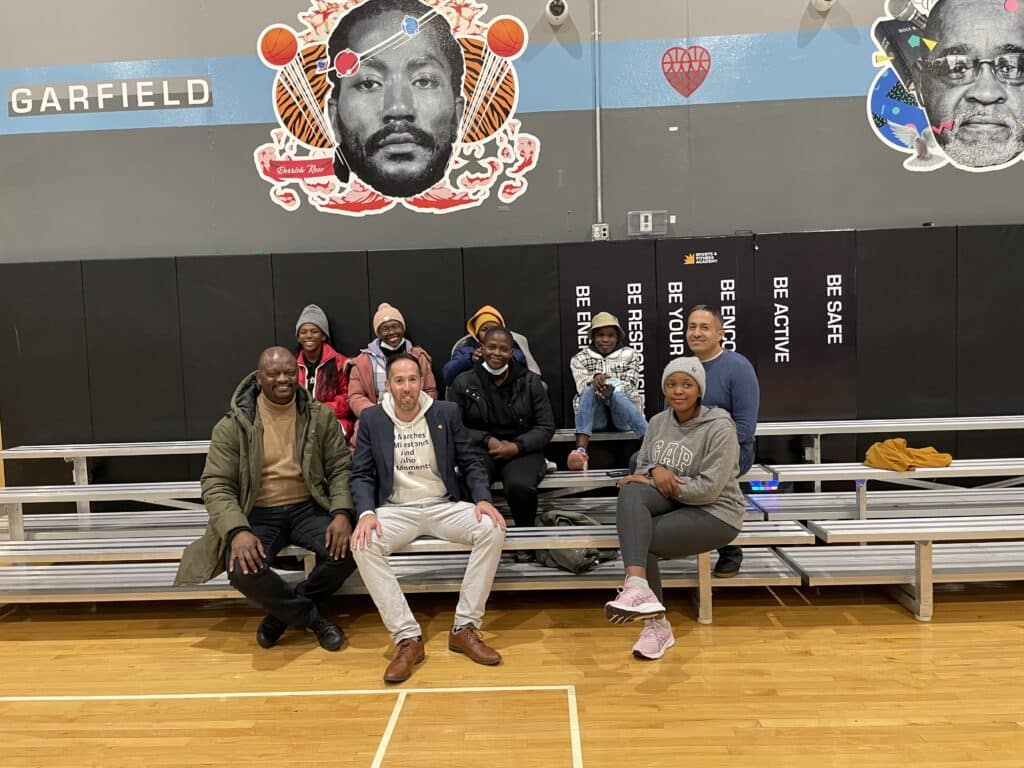
In one meaningful team building exercise, students were able to explore principles and practices of successful collaboration through a soccer game where the rules were altered to reflect the FIRST ecosystem’s values of “coopertition” and “gracious professionalism.” “Coopertition” is the practice of competing cooperatively in which a person will help their competition because the better they both are, the more they can do. In the same vein of competitive compassion,“gracious professionalism” is the idea of competing to the best of one’s ability, but to do it with grace and kindness. These two values harmonize well with Jackie and Dieudonne’s goals of pluralism and social inclusion because they encourage each member of the team to assess one another compassionately so that they can cooperate and work to each members’ strengths.
When the South African teens visited, they were taken on cultural tours of Chicago. These tours included all members of the team and many Chicago members visited places they had never visited. Students went to Little Village, Chinatown, and Robert Lindblom Math & Science Academy in West Englewood. Many of the South African students were surprised to see English as a secondary language in these neighborhoods, with the majority of signs being in Spanish in Little Village or Chinese in Chinatown. This encounter was particularly shocking to the adult South African on the trip who experienced apartheid, when assimilation to a dominant culture was expected. To see distinct Hispanic and Chinese cultural identities existing within a diverse society, and being celebrated by the community as a whole, was a new perspective and an example of the successes of cultural pluralism.
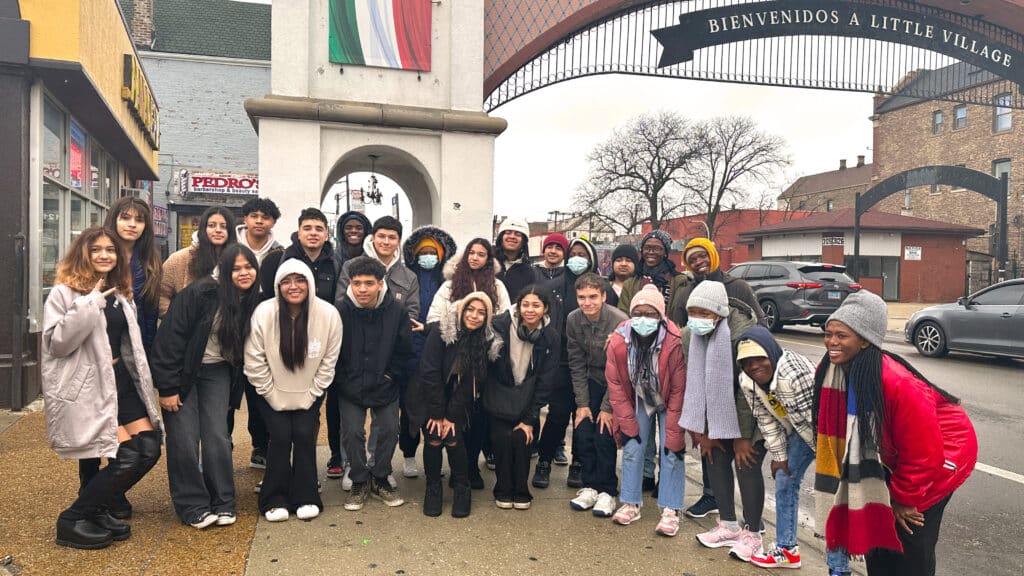
The teens who made up the Chicago Knights were incredibly dedicated to their team’s success, not only traveling internationally to learn robotics, but also sacrificing time from school and extracurriculars. The Chicago students missed Thursday and Friday for the competition, and a week of school to travel to South Africa in October. Hannah was a Chicago student who was new to the team this year. She was not able to travel to South Africa, but she worked consistently before and after the South African team arrived. For the competition, she took a break from her extracurricular activity of playing squash, missing a tournament to meet for robotics. This dedication to robotics helped the team members form close bonds and collaborate with one another and appreciate the diversity of the team.
The rules and guidelines for the FIRST Robotics competition came out in January, giving the team little time to build their robot in preparation. The 2022-2023 season of FIRST competitions was themed FIRST ENERGIZE, with activities encouraging the FIRST community to think about future energy sustainability. This challenge was inspired by the United Nations’ 7th Sustainable Development Goal, which is to ensure access to affordable, reliable, sustainable, and modern energy for all. The team built a mobile robot that was designed to play a custom game designed by FIRST. The robot uses a six-wheeled tank drive and is controlled remotely by a micro-controller called a roboRIO. It has an arm with a manipulator at the end which is composed of rollers that allow it to pick up and launch objects. The students built the entirety of the robot: interpreting drawings, measuring, cutting, drilling, and wiring electronics.
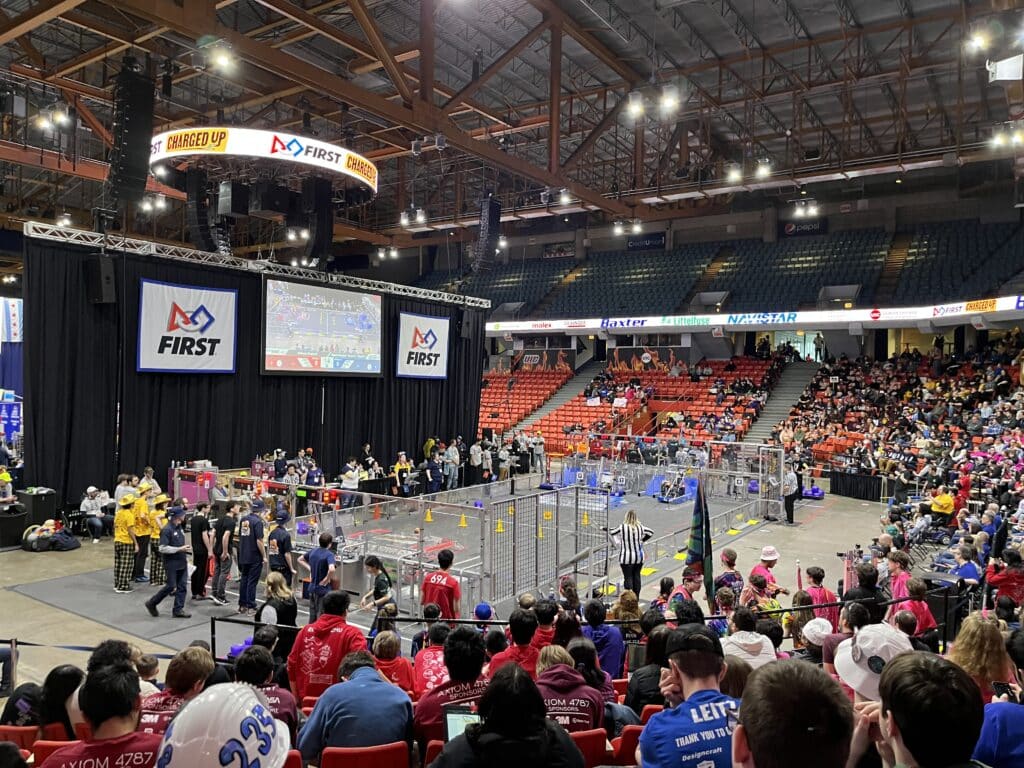
On the field were safety cones and inflatable spheres which needed to be gathered by the robots and moved to appropriate environments. Extra points could be achieved through creating links of particular objects within specific locations or by balancing the robot on an elevated platform with its teammates. Jackie and the Knights understood the game from a social perspective, referring to the manipulated objects as “cone people” and "square people” who could thrive by being placed together in diverse environments as a community which produces points as resources.
The team made an “Every-bot” design shared by the FIRST community which was designed to be accessible and constructible with basic tools. By focusing on the build, the team had a chance to get a lot of hands-on experience building by constructing the entirety of the robot in Chicago. The Chicago side of the team built an initial section of the robot, but when the South African students arrived they got to be a big part of finalizing the robot. Students learned skills and information on the sport to accomplish last-minute aspects of the build in the midst of the competition. One South African student named Litha came in without a great deal of hands-on experience but became a key member of the team working on electronics. She learned from mentors on the Knights and on other teams competing to gain the necessary skills to work on the electronics of the robot. Chicago students also stepped in to teach the South Africans what they had learned from prior builds. Reflecting on the process, Jackie noted, “I guess adversity builds strong bonds. We knew we had a deadline to meet, a very finite time to work on it, and they all worked together.”
Due to the timing of the South Africans arrivals and logistical challenges on the Chicago side, much of the building of the robot took place during the start of the competition. This came at the cost of missing the first day of competing, but provided bonding experiences and a lot of opportunities for the South African team members to gain the hand on building experience that they had been lacking. One student named Jalen, reflected on the building process: “We worked really hard. We would work from 9am-8pm because we had to build a whole robot in a week. We had to work quickly, make as few mistakes as we could, and stay focused.” Despite the rushed building process, the teens were very excited to participate in the competition and all came together to cheer when their robot made it to the competition floor.
As the teens on the Chicago Knights competed in the FIRST competition, they realized that cooperation was an essential part of the tournament. Many Chicago students went out of their way to teach South African students, who had limited experience building. For instance, Jalen was referred to as the “rivet master” for teaching the rest of the students how to use a rivet gun. Not only did teammates assist each other, but they were also helped by other teams. As the Knights crunched to build their robot, they were assisted by students from Lindblom to machine a ventilation pipe. Reflecting on her favorite memories working on the project, one student named Hannah reflected, “Cheering for our team at the competition was my favorite part. But we also got to go around and take pictures with other teams [...] I was shy to speak to other teams, but they were really nice and let me take pictures with them and their robots.” From start to finish, the FIRST competition was as much about compassion and collaboration as it was about competition, making it an excellent environment for cultural and intellectual exchange.
Meet the 2023 Chicago Peace Fellows
by Travis Rejman, Executive Director
The Goldin Institute invites you to learn about each of our 2023 Chicago Peace Fellows representing 14 community areas across the city. Founded in 2019 in collaboration with the Partnership for Safe and Peaceful Communities, the Chicago Peace Fellows program is the only leadership development program that is built by and for grassroots community leaders on the South and West sides of Chicago.

ABOUT GATHER
Peace Fellows participate in GATHER, an online asset-based community engagement course, as well as in-person training, collaborative action projects, and networking experiences with civic leaders, academic researchers, and policy makers. The Chicago Peace Fellows reduce violence by building relationships, engaging youth, collaborative peace building projects over the summer and by creating new networks among residents, families, schools, and nonprofit organizations.
The Fellows are learning together through GATHER, which is both a mobile platform for shared learning and a curriculum for people who want to build on the talents of their neighbors and the assets of their communities to make real and lasting change. Gather Fellows learn and work together through an innovative curriculum that comes pre-loaded on a tablet device with all the connectivity, materials, videos, practices and tools necessary to provide a mobile classroom and toolkit for community leadership.
The Chicago Peace Fellows project connects and equips cohorts of past grantees of the Chicago Fund for Safe and Peaceful Communities to reduce violence and promote peace. The 2023 Chicago Peace Fellows is the fifth all-Chicago cohort to utilize the GATHER platform, an online learning hub built by the Goldin Institute to empower grassroots leaders.
The Chicago Peace Fellows will engage in a 22-week course of intensive shared learning as well as group projects, culminating in a graduation event in September 2022. The curriculum has been designed in collaboration with the grantees themselves, based on their practical knowledge and hard earned wisdom, with input from a wide range of civic leaders. Fellows will reflect on their past summer work, identify successes and lessons learned, and improve their abilities by sharing strengths and learning new skills.
The Goldin Institute and the Partnership for Safe and Peaceful Communities have aligned missions that value authentic community leadership. The Chicago Fund is uniquely effective at finding motivated problem-solvers and community-builders. By connecting Chicago leaders through GATHER, their efforts to nurture safer and more peaceful communities will be more effective, interconnected and lasting.
OUR PARTNERS
A special thanks to the Chicago Community Trust, the Conant Family Foundation, Crown Family Philanthropies, the Frankel Family Foundation, the MacArthur Foundation, the Polk Bros. Foundation, the Racial Justice Pooled Fund, the Seabury Family Foundation, and the Partnership for Safe and Peaceful Communities for making this program possible.
To follow along the learning journey with the Chicago Peace Fellows, please sign up for our newsletter and follow up on Twitter, Facebook and Instagram.
How Ibali Lam is Empowering Women Entrepreneurs in South Africa
To mark this year’s International Women’s Day, the UN has chosen the theme of Technology and Innovation for Gender Equality – an area familiar to Dieudonne Allo (Global Fellow from South Africa) who is leading the Ibali Lam program through his organization Global Leading Light Initiatives. Ibali Lam is an exceptional example of empowering women through technology, by providing women entrepreneurs the digital tools and innovative approaches to storytelling to connect with existing and new customers and investors.
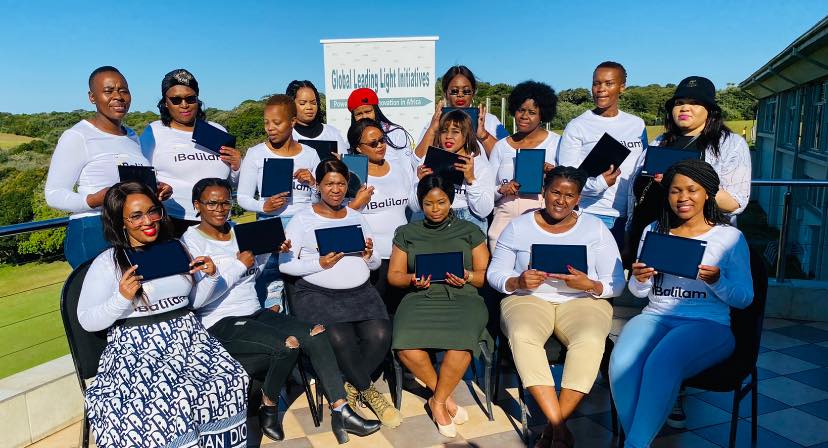
The project uses business storytelling, frugal innovation, investment readiness, and networking to help women whose businesses have been affected by COVID-19 to pivot new online models and engage existing and new audiences. The program also offers weekly roundtable sessions and one-on-one-coaching.
To mark International Women's Day, Global Fellow and CEO of Global Leading Light Initiatives Dieudonne Allo and Program Coordinator at Global Leading Light Initiatives Fatima Momoti share their insights on how their Ibali Lam program is improving women's lives, mainly through economic empowerment.
Marking International Women's Day
Fatima begins by elaborating on how women in today's world cannot interact without technology and storytelling.
“We need to empower ourselves with technology. If we are not going to move with the wave of technology, we will unfortunately get left behind and be stuck in that mentality of a previously disadvantaged group. Women need to be more in the forefront of development and innovation.”
She further elaborates on how the Ibali Lam initiative lifts women to achieve this.
"We are mainly in a rural area, so for these women to have a wider reach increases their income for their business. We come from setups that mainly have four to five people in a house, so having extra revenue means they can feed themselves and their families."
According to Fatima, when women beneficiaries understand what storytelling is they are able to better understand their customers and better craft their business online by using various social media platforms.
"Another component of the program is to ensure that we have a more holistic approach in helping these businesses accelerate and then from there help to set up the business aspect, the digital transformation."
Then, through investment readiness, women are introduced to potential investors.
"Women have been mainly talking to customers, and now it's changing from that to a potential investor. So, they get into that space when they can pitch to investors and get feedback."
This leads to more opportunities and stability for them.
Dieudonne places emphasis on women’s economic empowerment and its core role in the Ibali Lam program and importance for social justice
"Technology is advancing today, and every woman must empower herself to bridge the gap. Technology is a potent tool for women to transform themselves and empower themselves economically, because Ibali Lam is really about economic empowerment" -- Dieudonne Allo, Global Fellow from South Africa.
Gather as an Inspirational Path
Dieudonne highlights that Ibali Lam drew inspiration from the Goldin Institute’s GATHER program.
"The Gather program of Goldin Institute inspired the model of Ibali Lam. Women, especially in this part of the world, do not have access to technology, so we give them access; we provide internet data to them so they can access the online platform. Women get tablets, too.” he says.
Today, Dieudonne adds, one cannot interact without technology.
“Another thing without which you cannot interact is storytelling. For us, as Africans, storytelling is a very vital part of our culture. So, combining storytelling and technology women can connect to people and make them see value in their outputs and businesses.”
Ibali Lam’s Future Projects
Ibali Lam has to date supported 37 women and will continue to support women in other forms too. Concluding our conversation on a positive note, Dieudonne shares that they are working on a new project which will launch soon.
"Working with women, we can equip them with technological tools and their businesses can go online, but if they do not have access to finances, they cannot grow their businesses."
So, to support them, Ibali Lam has developed a new support program that will provide micro-grants for its alum. Follow Ibali Lam's work through their website.
Black Star Project Showcases Careers in Sports at the NBA All-Star Weekend
By: Zeki Salah, Communications Associate
The Black Star Project recently partnered with BDM Sports & Education Project to send Chicago students to Salt Lake City to learn about careers in sports at the NBA All-Star Weekend from February 17-19. This trip marked the third year that the Black Star Project has sent young people to the NBA All-Star Weekend to provide them with an inside look at the professional world of basketball and with a fun weekend of basketball events.
Brian McCoy, or Coach Q, began the BDM Sports & Education Project in 2014 with the goal of making a positive difference on the South Side after repeatedly hearing about violence on the news. “What I know is that a young person can’t shoot a gun and a ball at the same time. So I went to one of the roughest spots in Chicago and said, ‘Hey, I want to do a free sports camp for young kids’ [...] I think the kids I spoke to felt my sincerity because I gave them a clipboard and when I returned later the clipboard was filled on both sides.” Coach Q then went to his contacts in community activism and education, including Gloria Smith, a 2020 Chicago Peace Fellow, and approached them about starting a youth sports camp, with a focus on the business side of sports. He held his first camp in Englewood in 2014 and has continued to hold basketball camps, baseball camps, and most recently an introduction to golf.
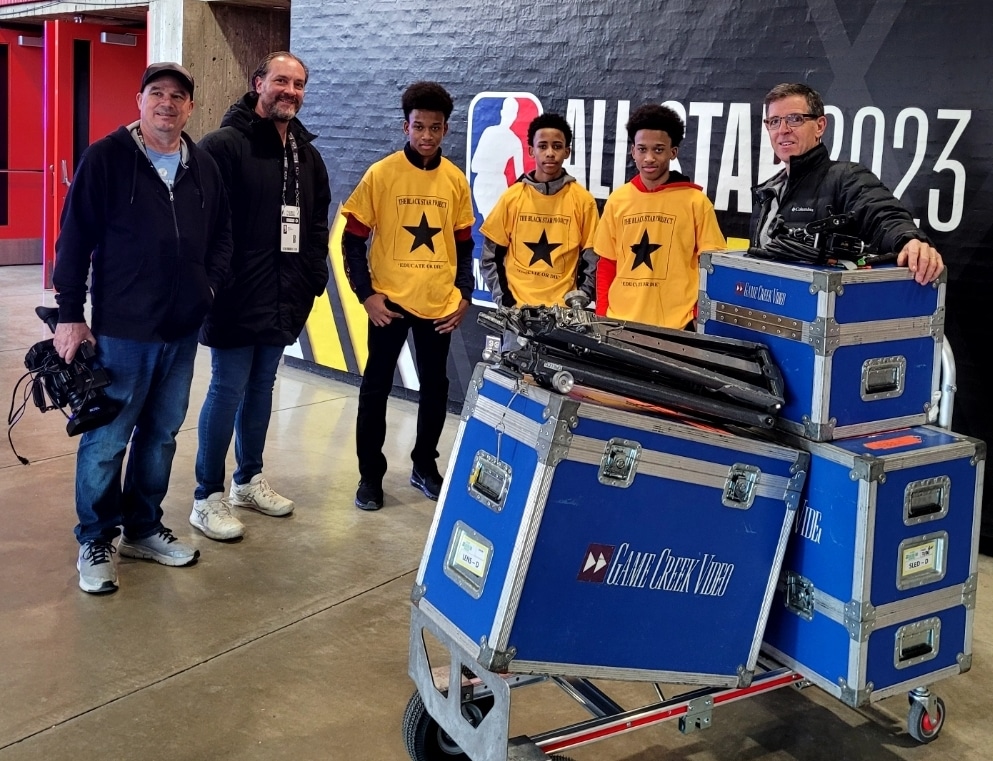
The trips to NBA All-Star Weekends have been held by Coach Q and the Black Star Project for the last three years. The trips aim to combine an introduction to the business of sports with a fun weekend for teens on the South Side. The trips place a focus on academics and include essay contests before and after the trip. In prior years, the Black Star project has chosen participants for the trips based on essays that they write on their interest in a career in sports. This year, an essay contest is being held for a cash prize following the trip. Coach Q and the Black Star Project also provide a ten week business of sports curriculum leading up to the trip, which allows the young people to learn about the different professions within the sports industry before they go on to meet them at events such as the All-Star Weekend. Speaking to the idea of synthesizing the business aspect and sports aspect of the trip, Coach Q said:
The average young person wants to be the next Lebron James, but in actuality, the probability is really slim [...] So, what I try to do is let them know that it’s okay to have dreams, but let them know the reality of the situation and ask: ‘What are you really looking for?’. By taking them to the game you can show them both sides, the excitement, but also the thousands of people making that game happen. There’s a camera man, a sports physician, a sports attorney, an agent, a sports statistician, a kinesiologist; there’s so many different careers involved that no one ever talks about.
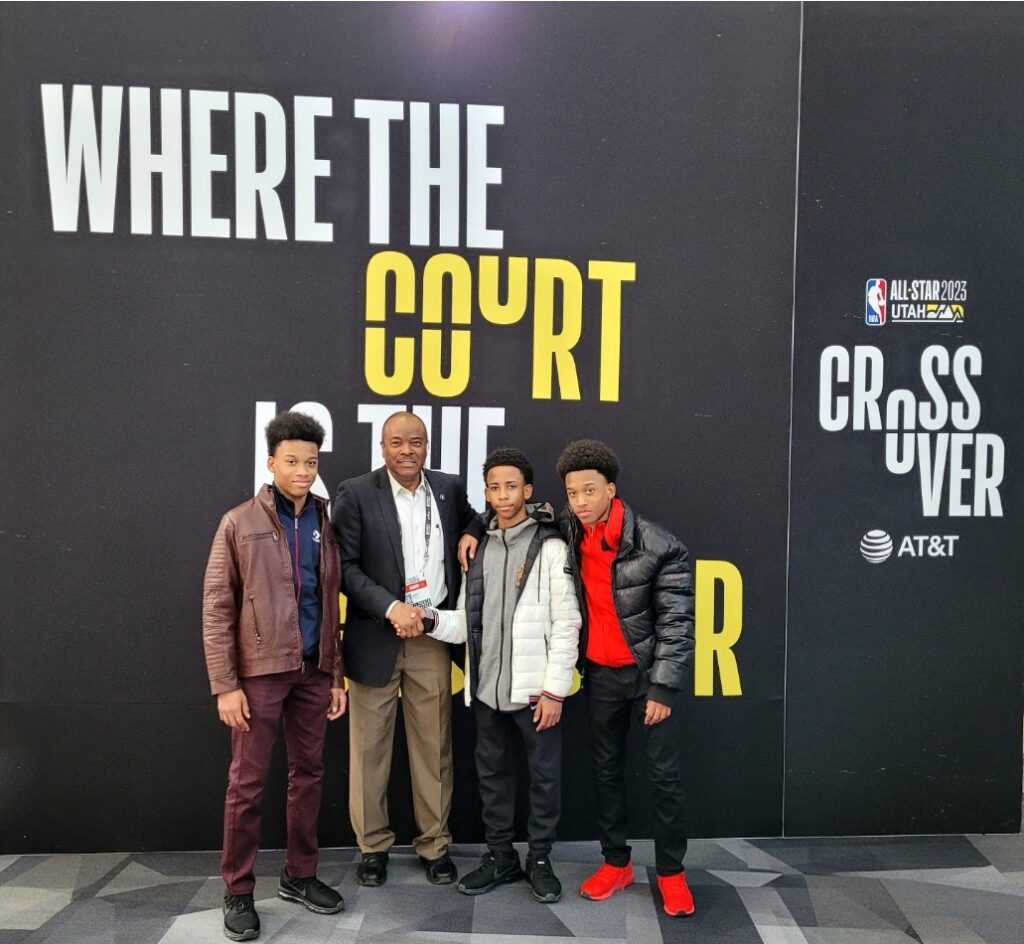
The Black Star Project took the lead on programming and fundraising for the All-Star weekend, while Coach Q accompanied the young people and introduced them to professionals in the sports business. The first event they attended was the HBCU Classic, an annual basketball game between two Historically Black Colleges and Universities (HBCUs) that was started by the NBA to show their commitment towards social justice in response to boycotts during the Black Lives Matter movement. The young people on the trip also participated in an HBCU college fair and learned about the NBA’s HBCU Fellowship program, which aims to provide career development opportunities in the business of basketball for undergraduate and graduate students from HBCUs. After the fair, the young people were also able to meet and greet with sports business professionals.
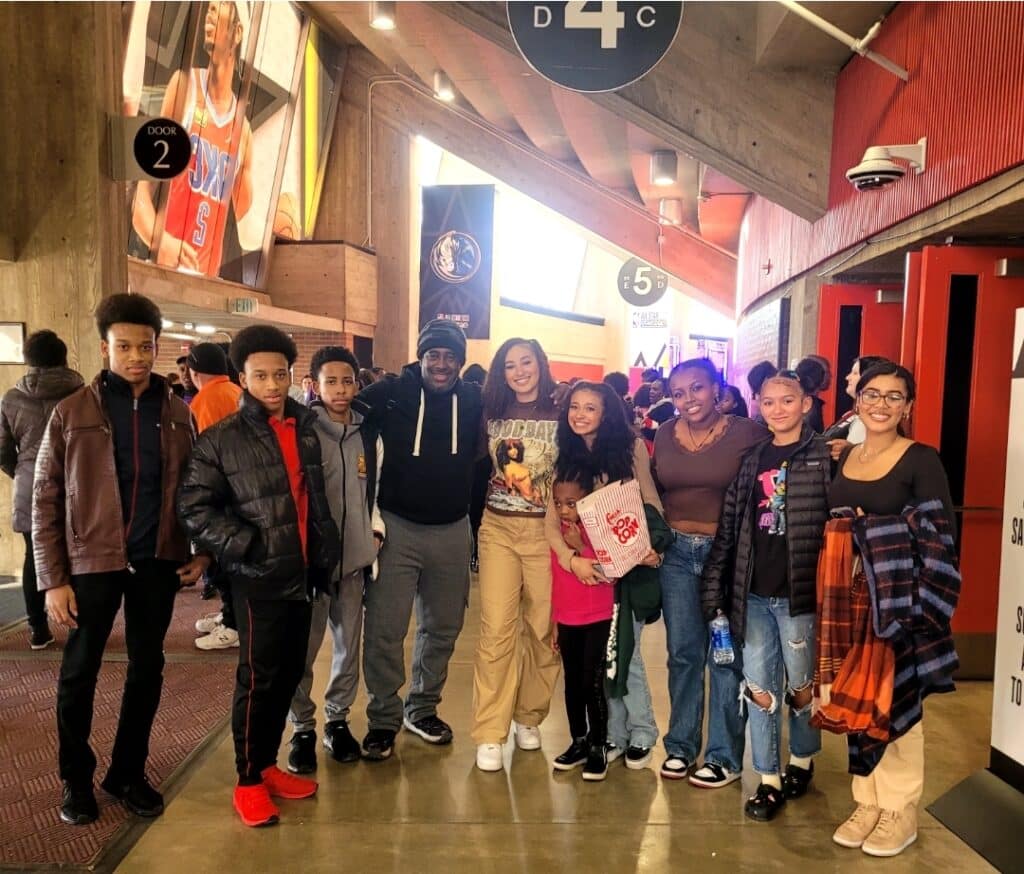
Throughout the weekend, programming combined both opportunities for the young people to have fun and enjoy basketball programming and an inside look into potential careers. The young people on the trip were able to have dinner with Rev. Jesse Jackson, who attended the University of Illinois on a football scholarship. He provided insight as to how entering the business of sports could allow an individual to transition to other careers, such as career as a minister and civil right leader. There was also a more leisurely section of the trip where the young people attended the NBA Crossover, which is a multi-day interactive fan event that brings basketball culture to the forefront, featuring player appearances, live performances, art, and music. Combining both business and pleasure helped the young people think about their futures in a fun and energetic setting and provided them with a one of a kind opportunity.
Coach Q and the Black Star project aim to continue to hold trips to NBA All-Star Weekends for young adults on the South Side. They hope to not only hold trips to the NBA All-Star games, but also to the WNBA All-Star games so that young women can get involved as well. The next WNBA All-Star game will be held in Las Vegas in July. You can support the Black Star Project and their efforts to send students to these games to learn about the business of sports here.
BDM Sports & Education Project's (Powered by the Black Star Project) 4th Annual Youth Business of Sports Essay Contest
Following the trip to Salt Lake City, BDM Sports and Education Project held an essay contest for high school students with the following prompt: "The average NBA playing career is about 5 years, how should players maximize their opportunities for personal growth and professional development, during their time playing in the league, while also preparing for when their NBA playing career comes to an end... Life Beyond the ball?"
Winners of the contest include:
1st Place Winner ($1,000): Brandon Williams-Orr, Providence St Mel HS
2nd Place Winner ($500): Aaron Williams-Orr, Providence St Mel HS
3rd Place Winners (Tied) ($250): Laylah Richmond, Bolingbrook HS and Antonio Scott, Little Black Pearl HS
